Among AMD’s bold claims about Zen 5’s gaming performance was that the Ryzen 7 9700X would be 6% faster than Intel’s Core i7-14700K. However, AMD has since walked back this claim, stating in a blog post that when running the 14700K with Intel’s “Extreme” profile and the same high-speed memory that most reviewers use, the 9700X performs on par with the 14700K.
This suggests that AMD’s initial claims were based on heavily nerfed Intel performance by limiting the 14700K to the 125W profile – a profile that Intel had officially stated was not to be used with K-SKU parts.
Now, putting that aside for a second, claiming that the 9700X delivers the same level of gaming performance as the 14700K is still bold, considering it was 5% slower in our day-one review. So, how do they compare across more than 40 games, using both the current Windows 11 23H2 build (without the recent patch) and the Insider Preview 23H2 build?
Today, we’re finding out, and as usual there’s a lot to cover. We won’t be discussing every single tested title but we’ll show you the individual results for about two dozen of the more interesting results, followed by an analysis of the breakdown graphs covering all 42 games.
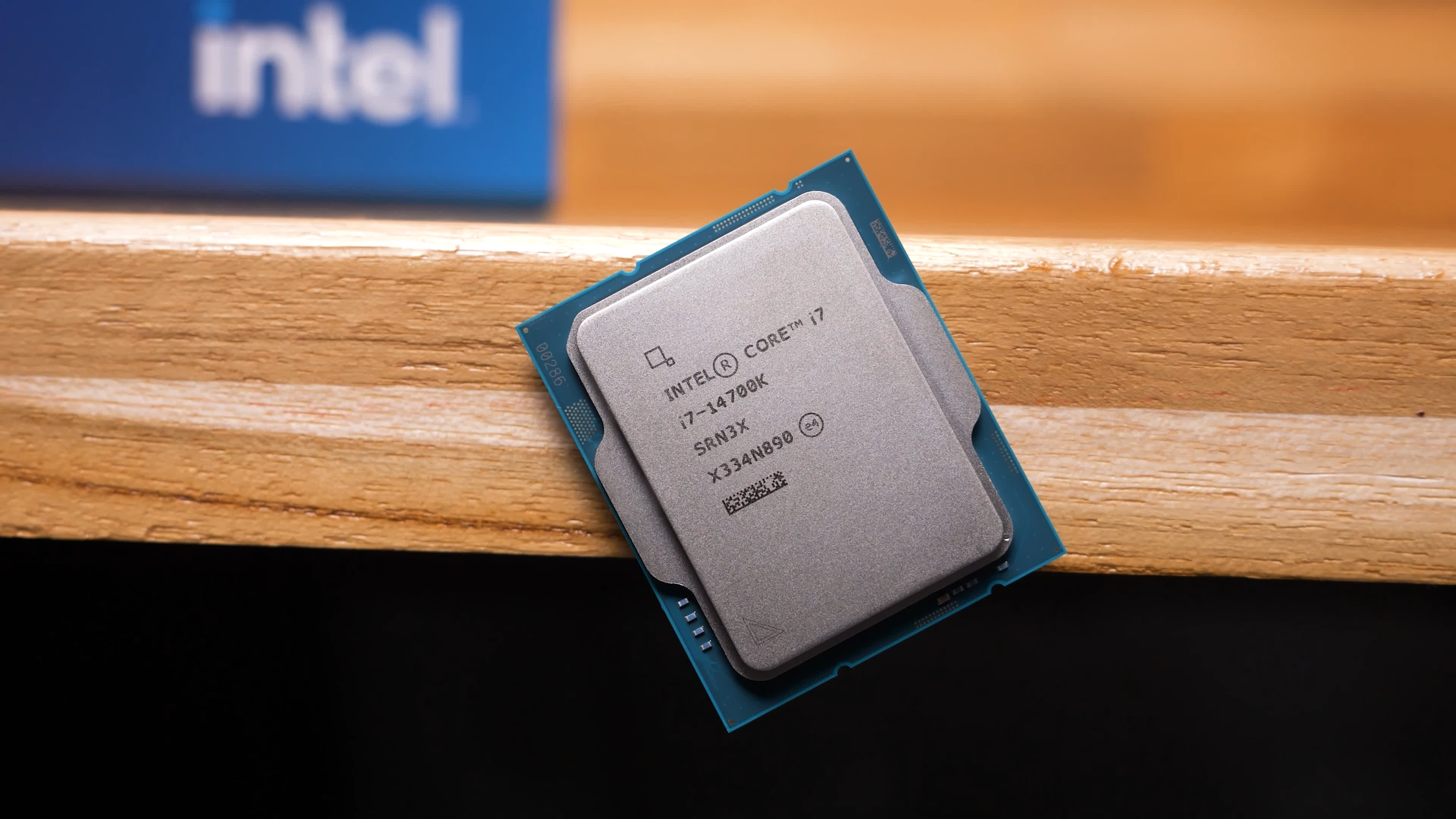
For testing the Core i7-14700K, we’re using the latest BIOS with the Microcode update and running the Intel Extreme profile, setting PL1 and PL2 to 253W. We’ve also updated the X670E board to BIOS version F33b, though we’re not enabling the 105W TDP mode, which would make little difference for the 9700X anyway.
Let’s dive in…
Test Setup
| CPU Motherboard Memory |
|
| AMD Ryzen 7 9700X G.Skill Trident Z5 RGB 32GB DDR5-6000 CL30 Gigabyte X670E Aorus Master [BIOS F33b] DDR5-6000 [CL30-38-38-96] |
|
| Intel Core i7-14700K [Intel Extreme Profile] MSI MPG Z790 Carbon WiFi [BIOS 7D89v1D] G.Skill Trident Z5 RGB 32GB DDR5-7200 CL34 DDR5-7200 [CL34-45-45-115] |
|
| Graphics Card | Asus ROG Strix RTX 4090 OC Edition |
| ATX Case | MSI Prospect 700R |
| Power Supply | Kolink Regulator Gold ATX 3.0 1200W |
| Storage | TeamGroup T-Force Cardea A440 M.2 PCle Gen4 NVMe SSD 4TB |
| Operating System | Windows 11 |
| Display Driver | GeForce Game Ready Driver 561.09 WHQL |
Benchmarks
Assetto Corsa Competizione
First up, we have ACC, and using 23H2, we find similar performance between the 9700X and 14700K, though the 1% lows of the Intel processor were 7% higher. Switching to the Insider Preview, the performance of the 14700K remains unchanged, but the 9700X saw an 8% increase, giving it a comfortable lead.

Halo Infinite
Moving on to Halo Infinite, we again find that the 14700K delivers similar performance using either version of Windows, while the 9700X was 4% faster using 24H2, a small increase that brought it slightly closer to the Intel processor.
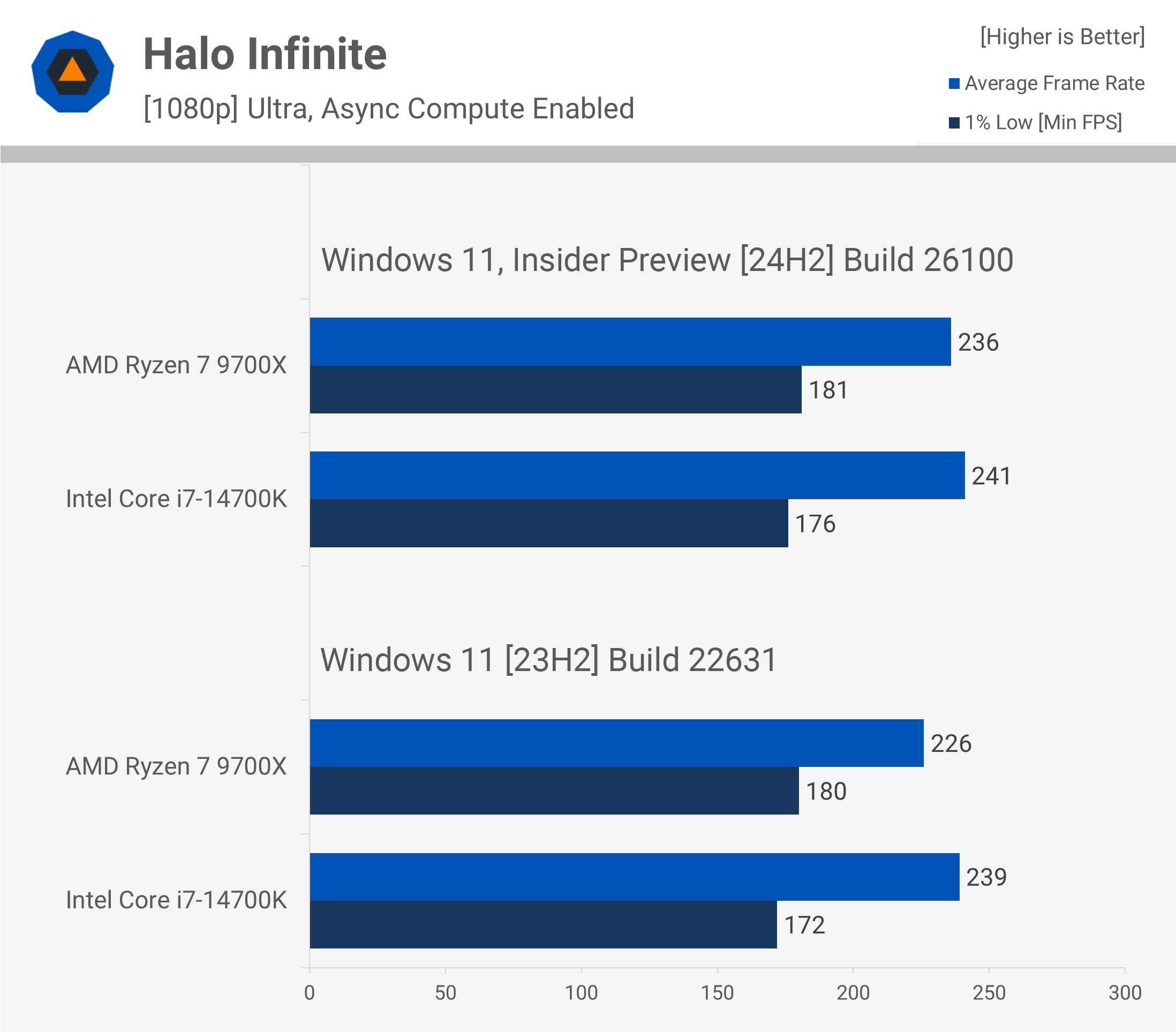
F1 24
Testing with F1 24 shows the 9700X just edging out the 14700K by a 4% margin on the current 23H2 build. However, when we move to 24H2, the 9700X becomes 9% faster, a noteworthy margin in favor of the AMD processor.

Call of Duty: Modern Warfare III
Performance in Modern Warfare III remains consistent across both versions of Windows 11, with the 9700X averaging 6% faster.
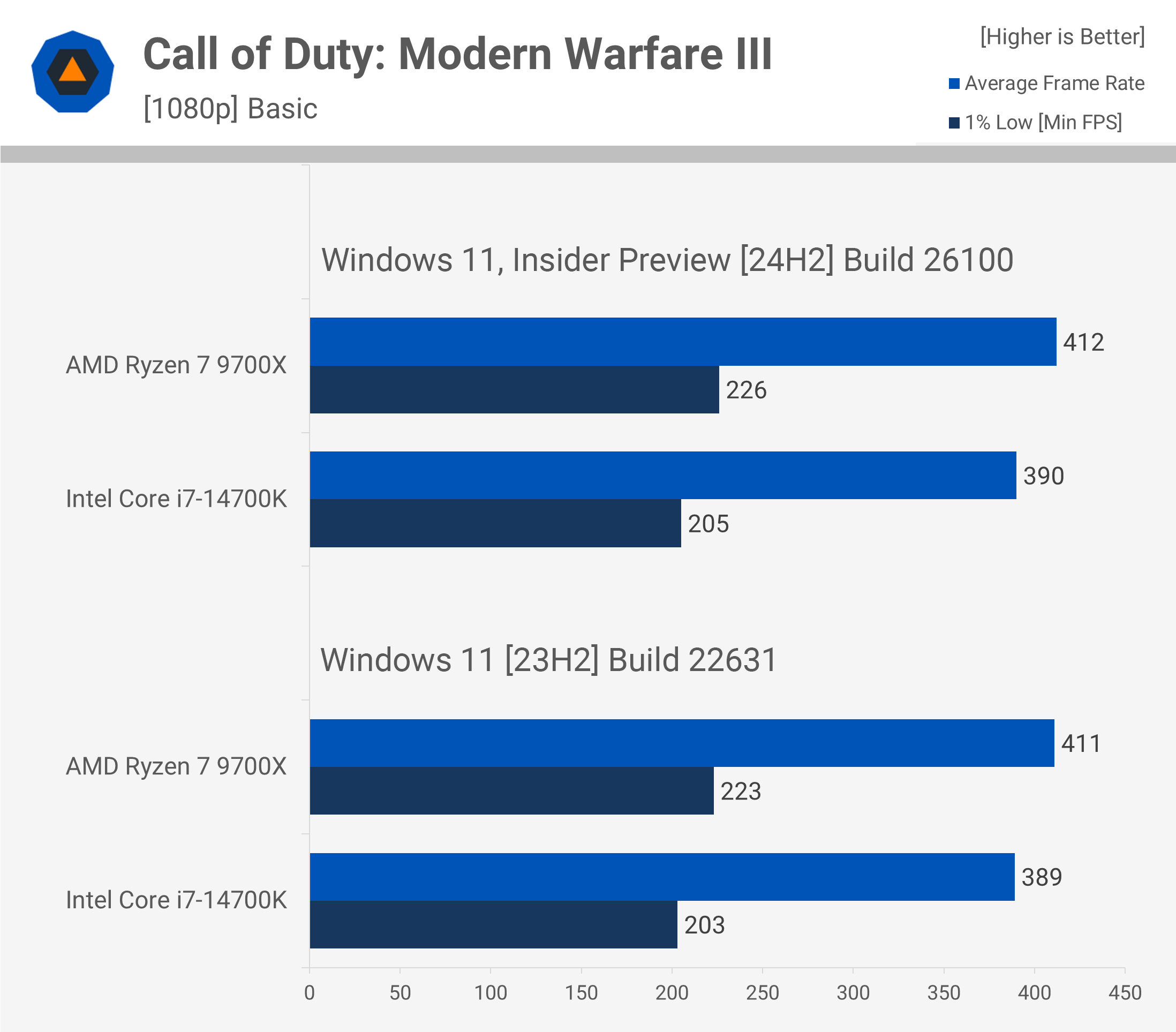
Microsoft Flight Simulator 2020
Microsoft Flight Simulator 2020 highlights an issue with 23H2 for Ryzen. Whatever causes the performance regression is resolved in 24H2, as the 9700X goes from being 13% slower than the 14700K on 23H2 to being on par with it on 24H2.
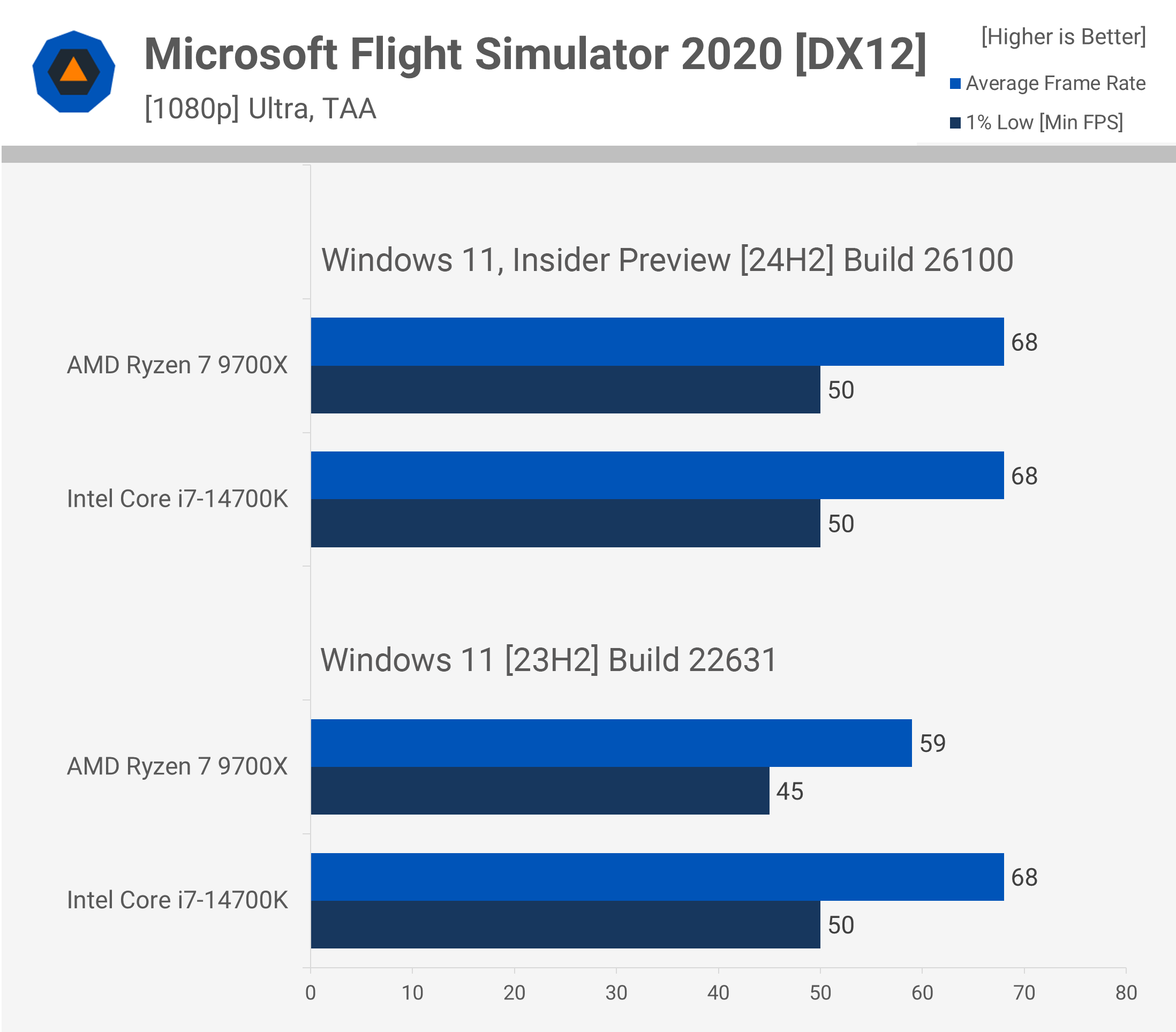
Spider-Man Remastered
We don’t see the same level of improvement in Spider-Man Remastered. While the 9700X is 15% slower on 23H2, it becomes 9% slower on 24H2, a reasonable margin but still a notable improvement for the Ryzen processor.
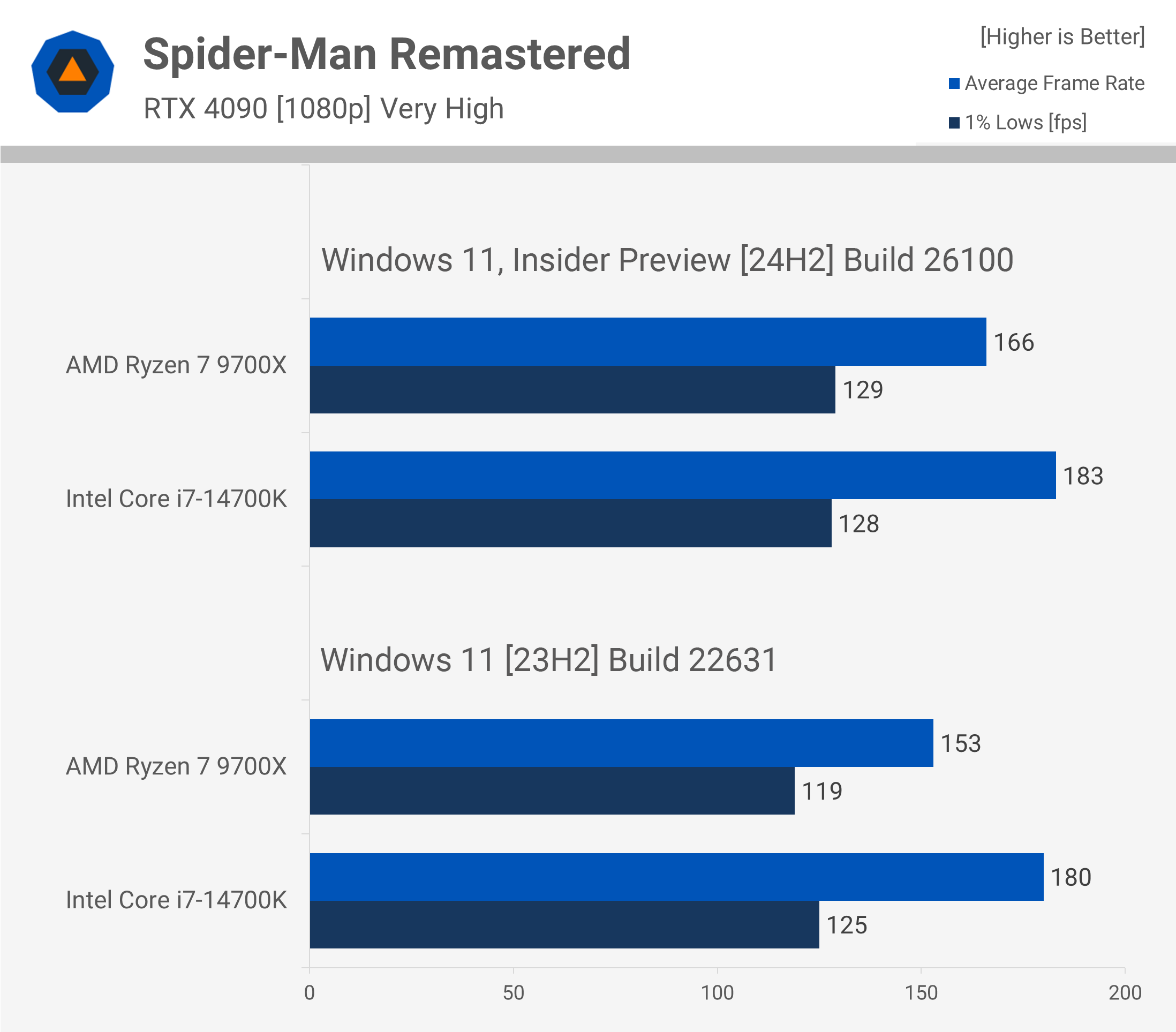
A Plague Tale: Requiem
Using 23H2, the 9700X was just 3% faster than the 14700K, but on 24H2, that margin extends to 9%, another significant performance gain in favor of the Ryzen processor.
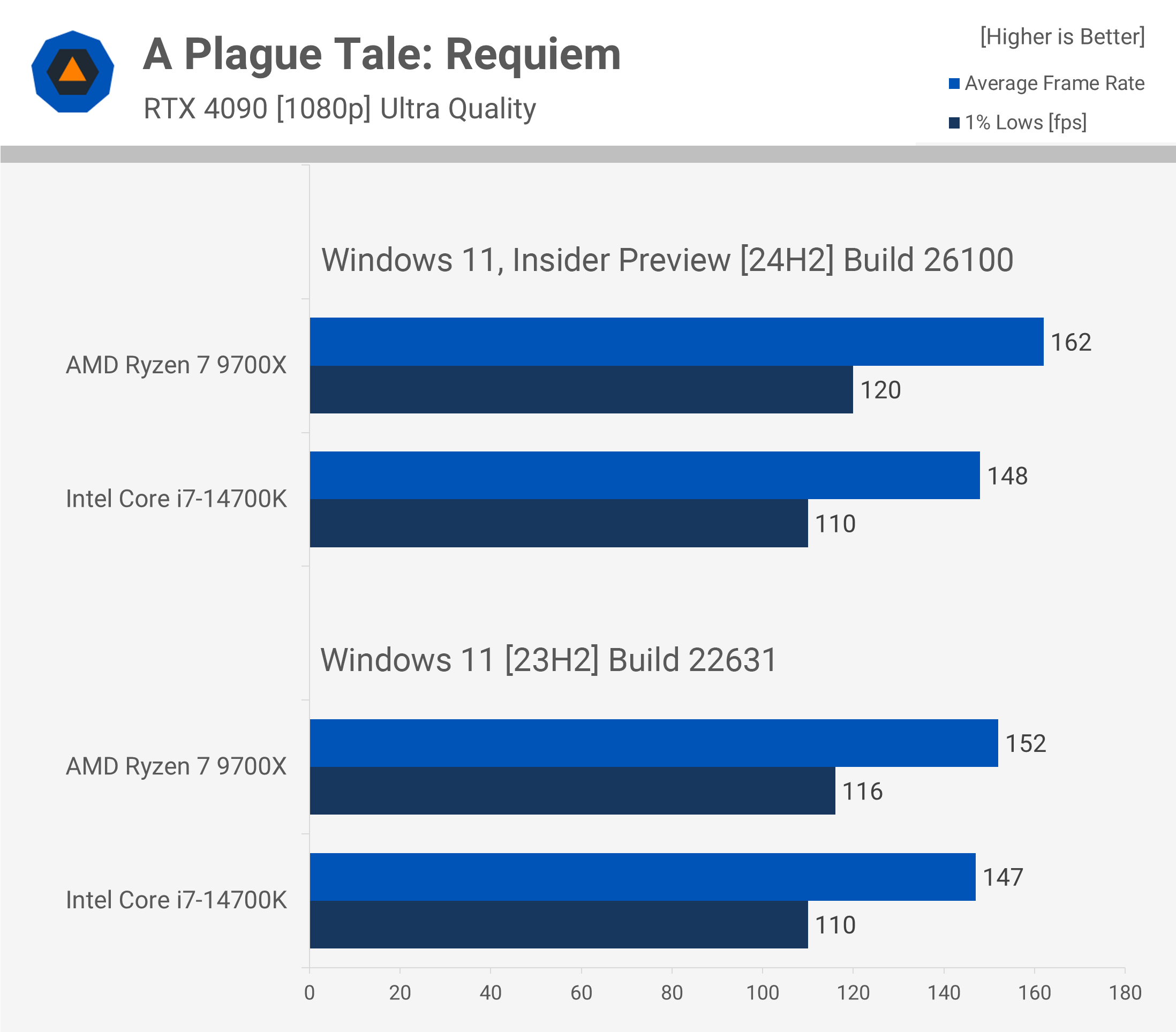
Ghost of Tsushima
Testing with Ghost of Tsushima, we see the 9700X was 4% slower than the 14700K on 23H2. However, moving to 24H2 pushes it slightly ahead by 2%, making performance comparable overall but still an improvement for the Ryzen processor.
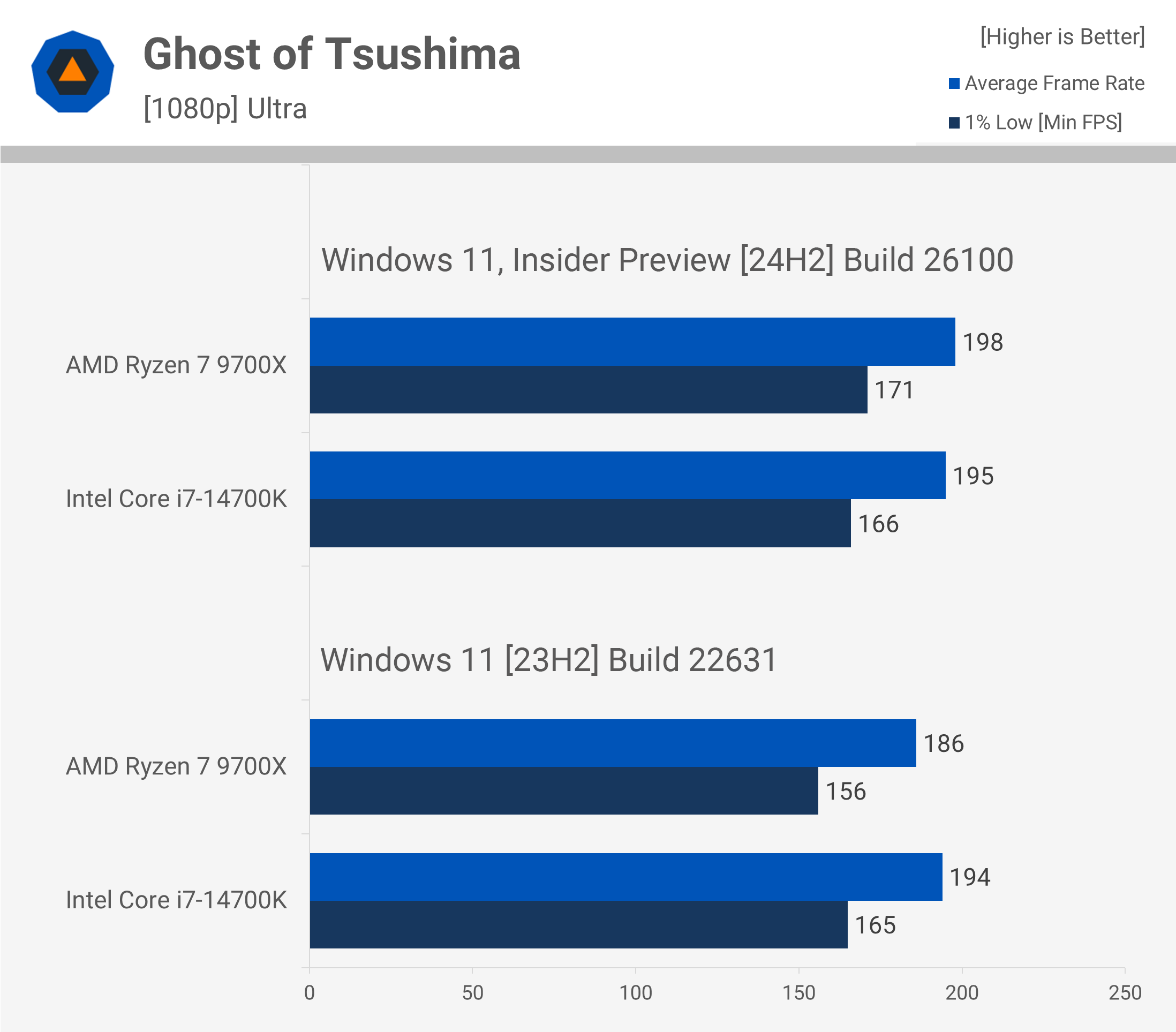
Cyberpunk 2077: Phantom Liberty
The Cyberpunk 2077: Phantom Liberty results resemble those of Microsoft Flight Simulator. On 23H2, something limits Ryzen’s performance, as the 9700X is 6% slower than the 14700K. However, moving to 24H2 brings performance to parity.
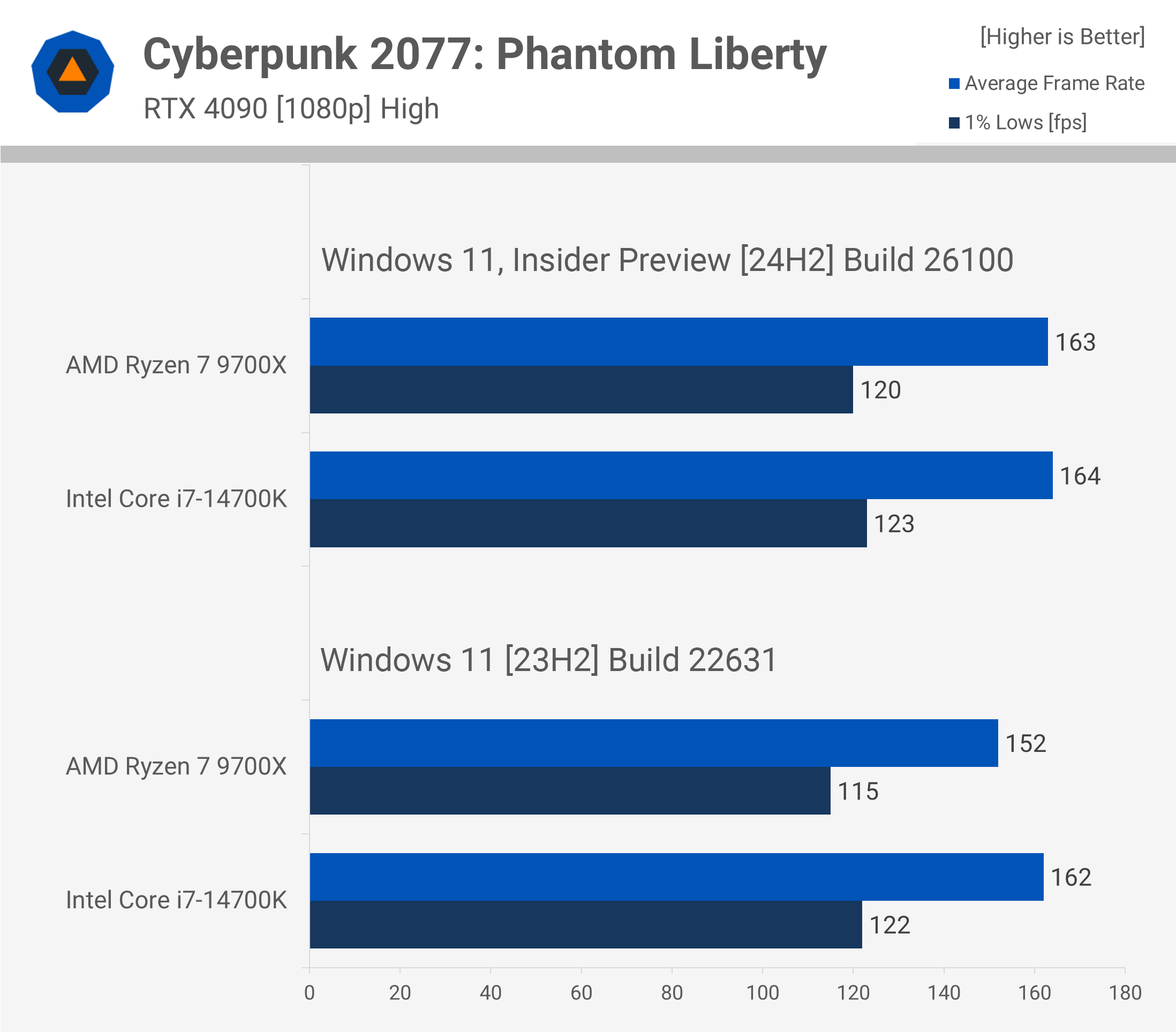
Borderlands 3
In Borderlands 3, the 14700K delivers similar performance on both 23H2 and 24H2, while the 9700X saw a 10% uplift. However, the 1% lows remain much lower for the 9700X compared to the 14700K, which is a bit unusual.

Baldur’s Gate 3
There was no performance improvement for either processor on 24H2 in Baldur’s Gate 3, leaving the 9700X significantly slower than the 14700K – around 12% slower, in fact.
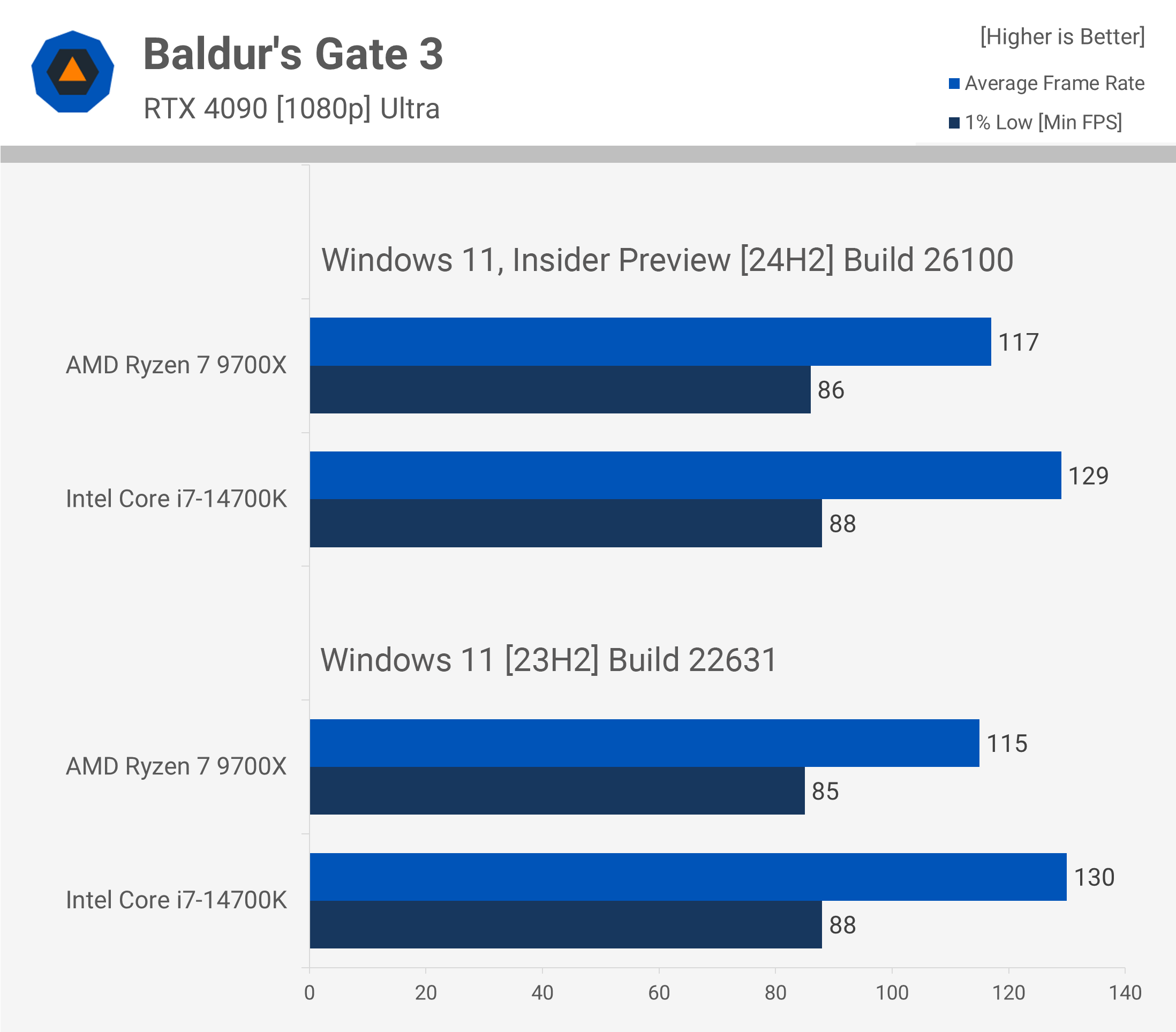
Black Myth: Wukong
The 14700K delivered the same performance in Black Myth: Wukong on both versions of Windows 11, while the 9700X was 5% faster on 24H2, placing it on par with the 14700K, at least in terms of average frame rate. However, the 1% lows were still higher on the Intel processor, with a 10% difference when looking at the 24H2 data.

Hitman 3
Both CPUs saw a 3% performance uplift on 24H2, which meant the 14700K remained about 12% faster than the 9700X, giving Intel an easy win in this case.
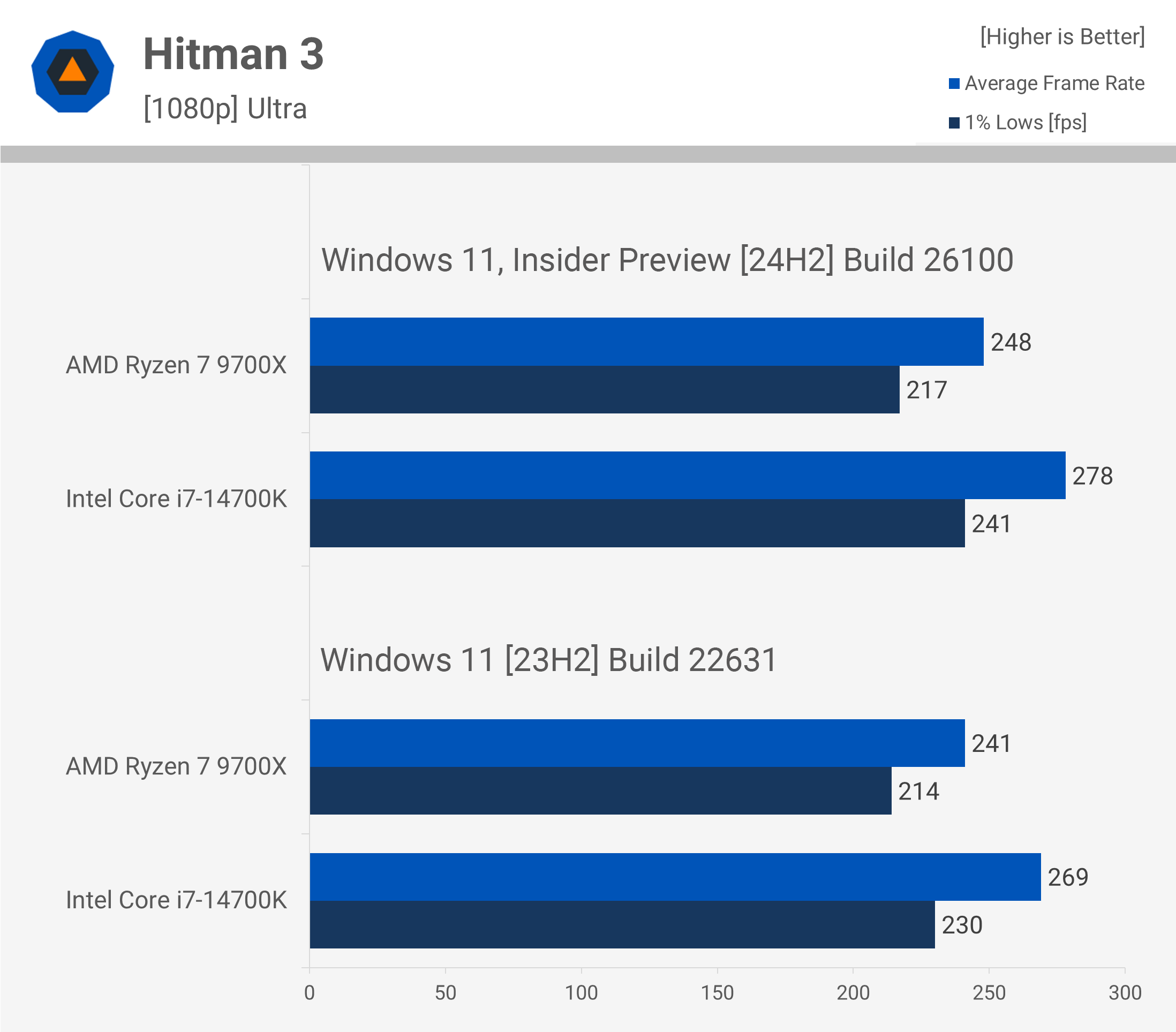
Total War: Warhammer III
The 9700X isn’t able to surpass the 14700K in Warhammer III, but it gets reasonably close depending on the version of Windows 11 used. On the current 23H2 build, it’s 8% slower, but with 24H2, it’s just 5% behind, and we also see the 1% lows narrow.
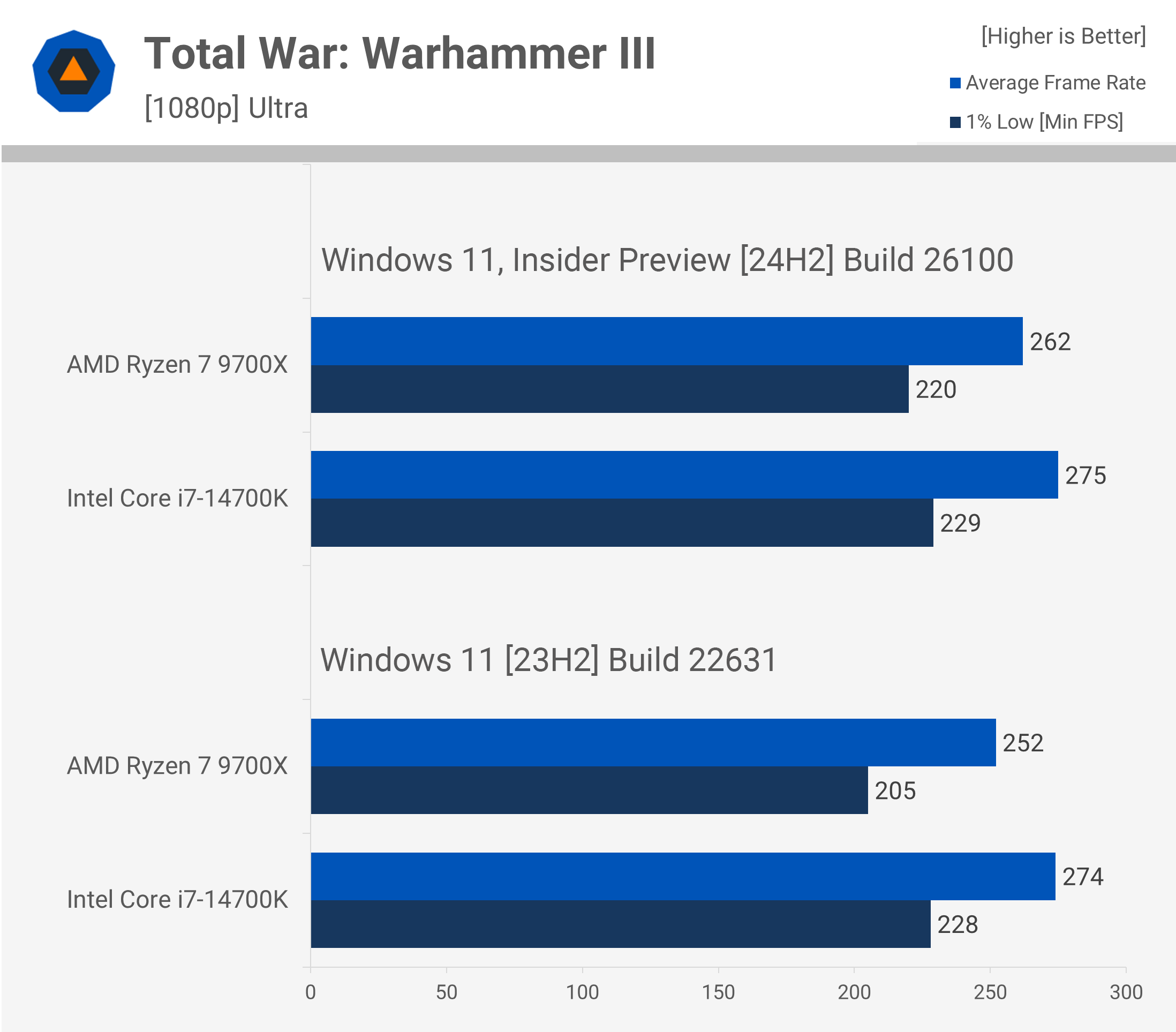
Returnal
In Returnal, there was no performance difference between the two CPUs across either version of Windows. We saw similar results in a surprisingly large number of games, which we’ve skipped over due to their lack of significance. However, they will be featured in the breakdown graphs later in this review.
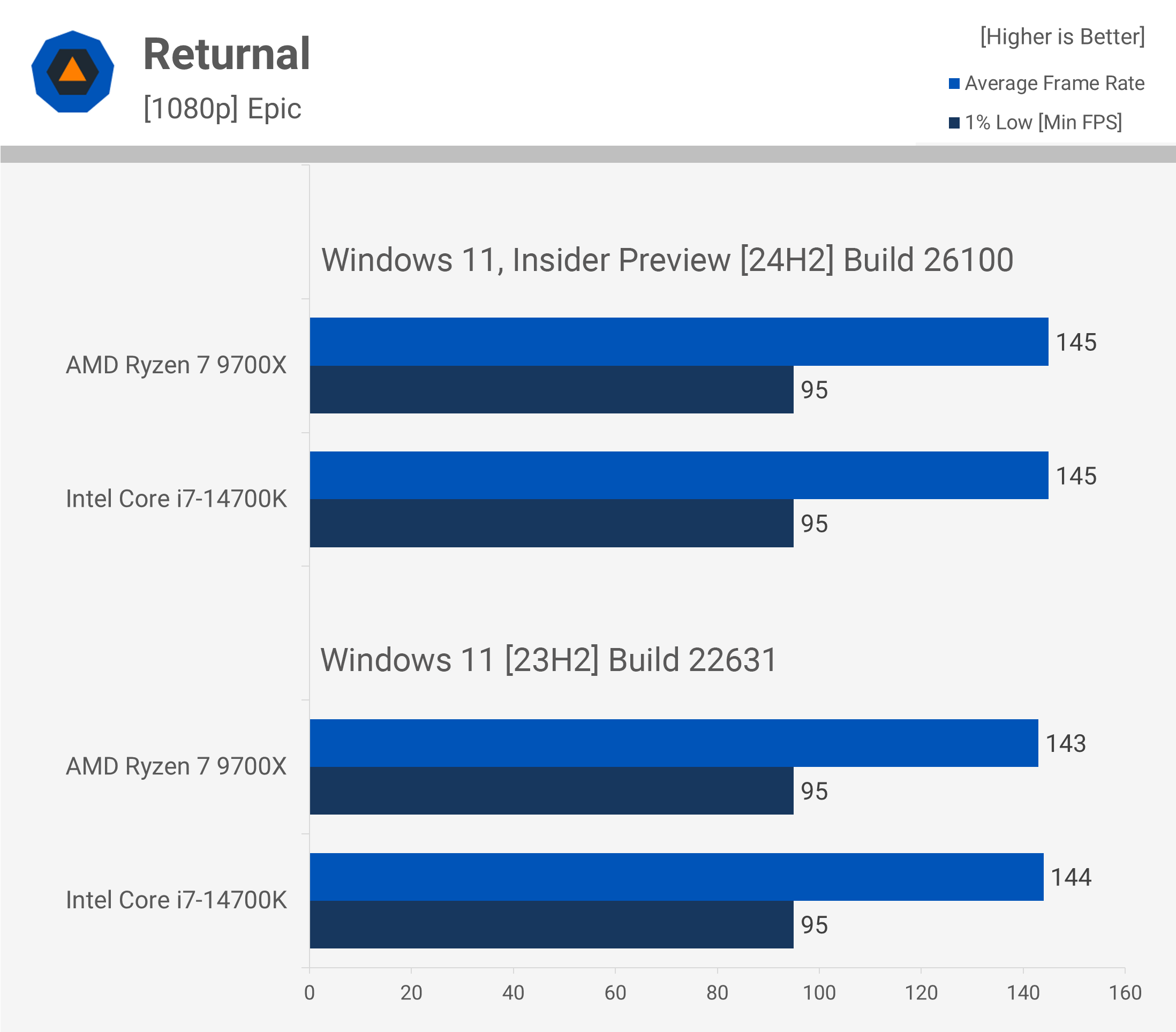
Hogwarts Legacy
In Hogwarts Legacy, both CPUs saw a significant performance uplift after upgrading to 24H2. On the 23H2 build, the 14700K was 14% faster than the 9700X, but on 24H2, that gap closed to just 6%. This was due to the Ryzen processor enjoying a 17% performance increase. Even the Core i7 gained a 10% improvement, so Hogwarts Legacy clearly performs much better on 24H2.
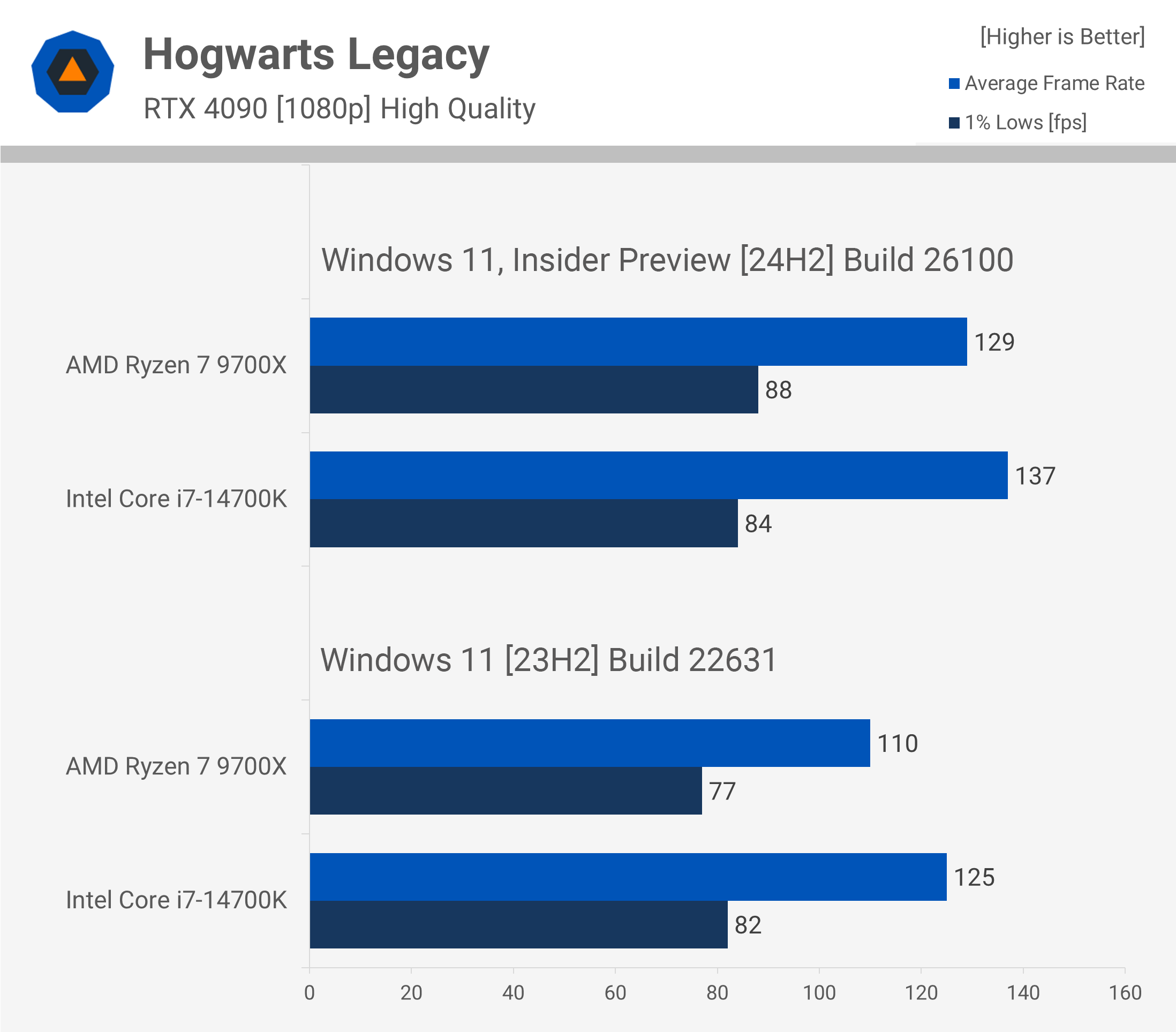
Star Wars Jedi: Survivor
The Star Wars Jedi: Survivor results are intriguing, and it’s important to note that this data was recorded before the recent patch. On 23H2, the 14700K outperformed the 9700X by 6%, but unexpectedly, that margin widened to 11% on 24H2, as the Intel CPU received a massive 20% performance boost.
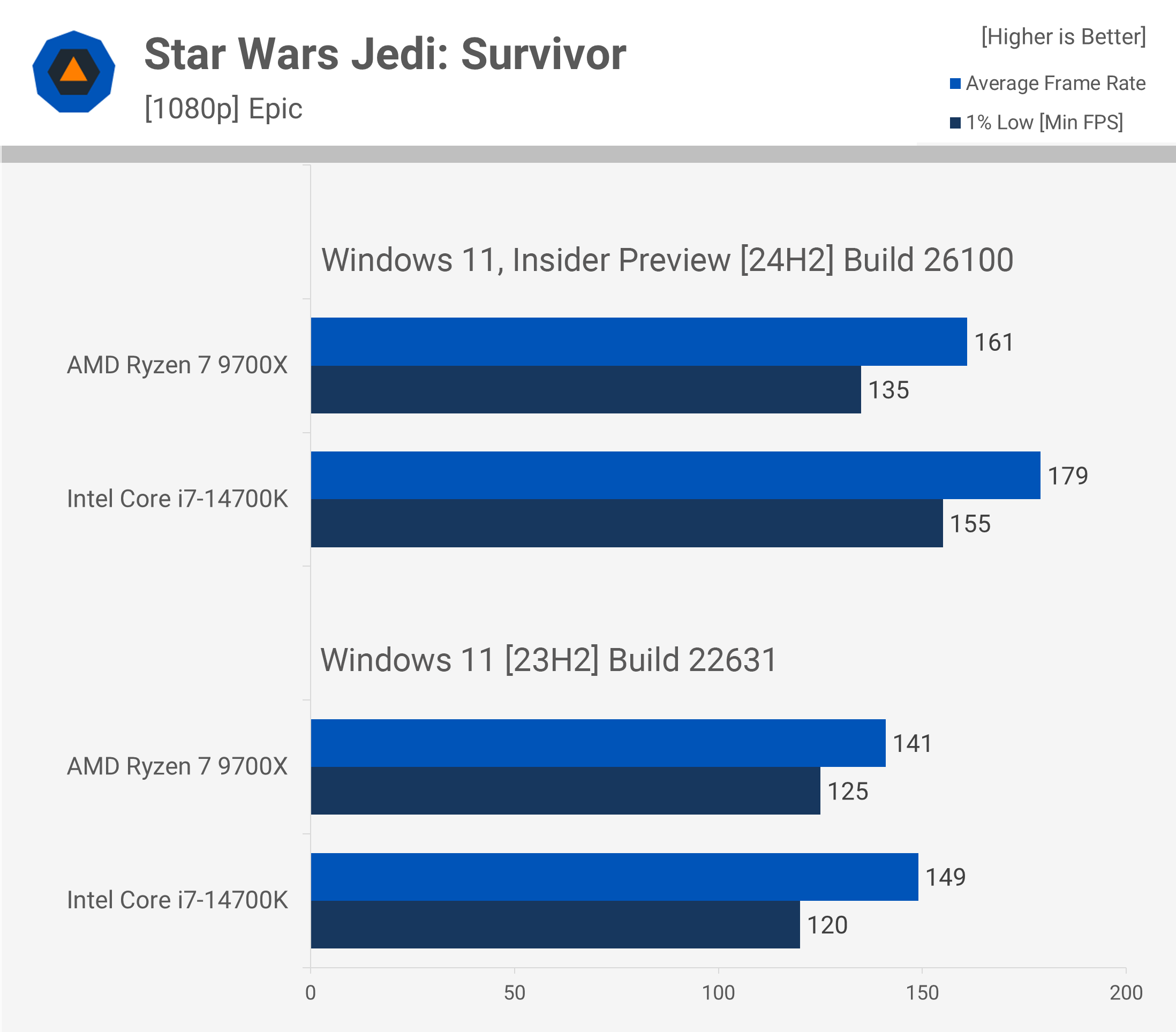
Dying Light 2
Both CPUs saw a small performance improvement when moving to 24H2, but in this case, the scaling remained consistent, with the 14700K maintaining a 9% lead over the 9700X on both versions of Windows 11.
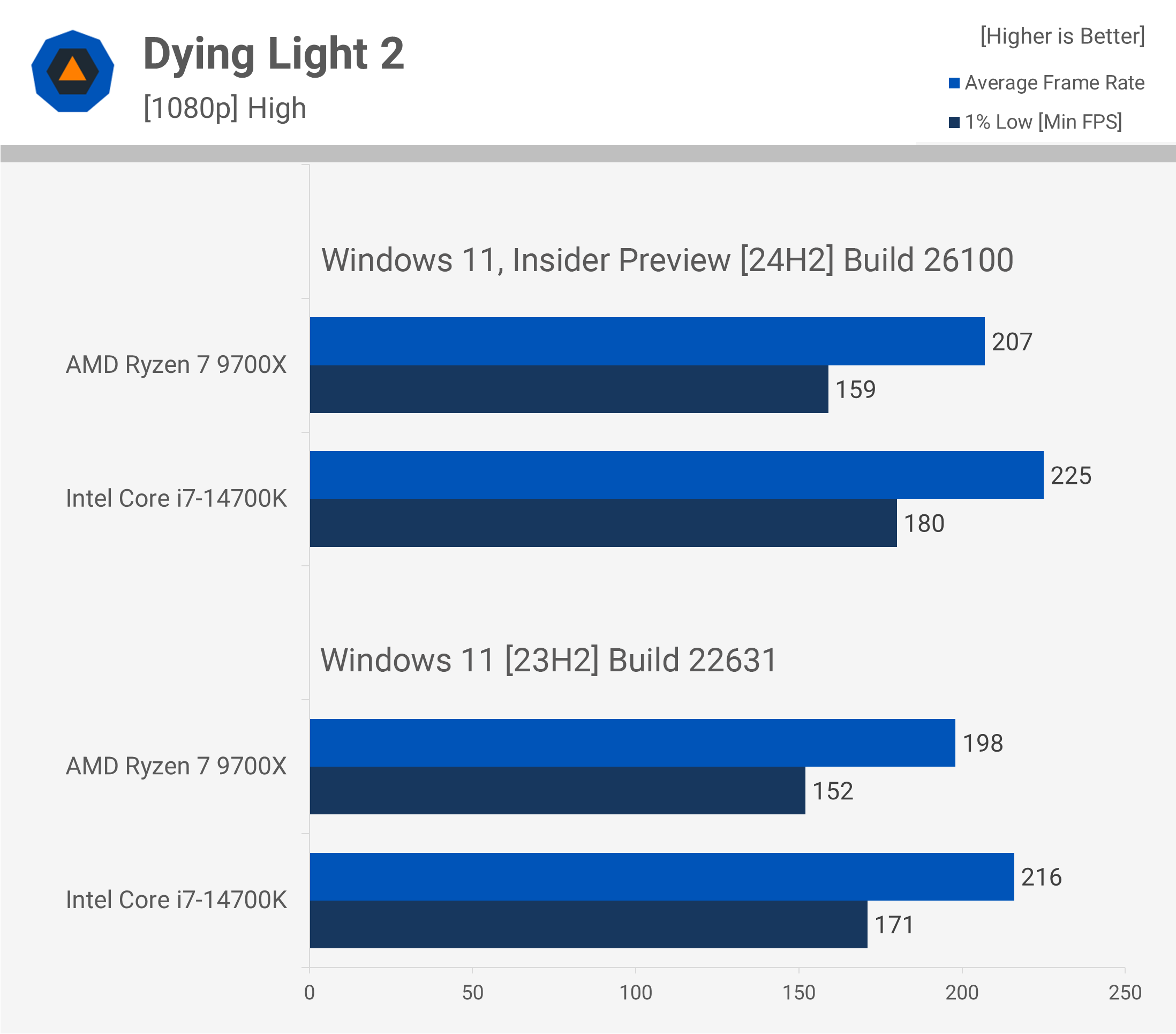
The Last of Us Part 1
Both CPUs also showed performance gains on 24H2, but the 14700K remained faster in both cases. On 23H2, the Intel processor was 8% ahead, and on 24H2, that margin extended slightly to 10%.
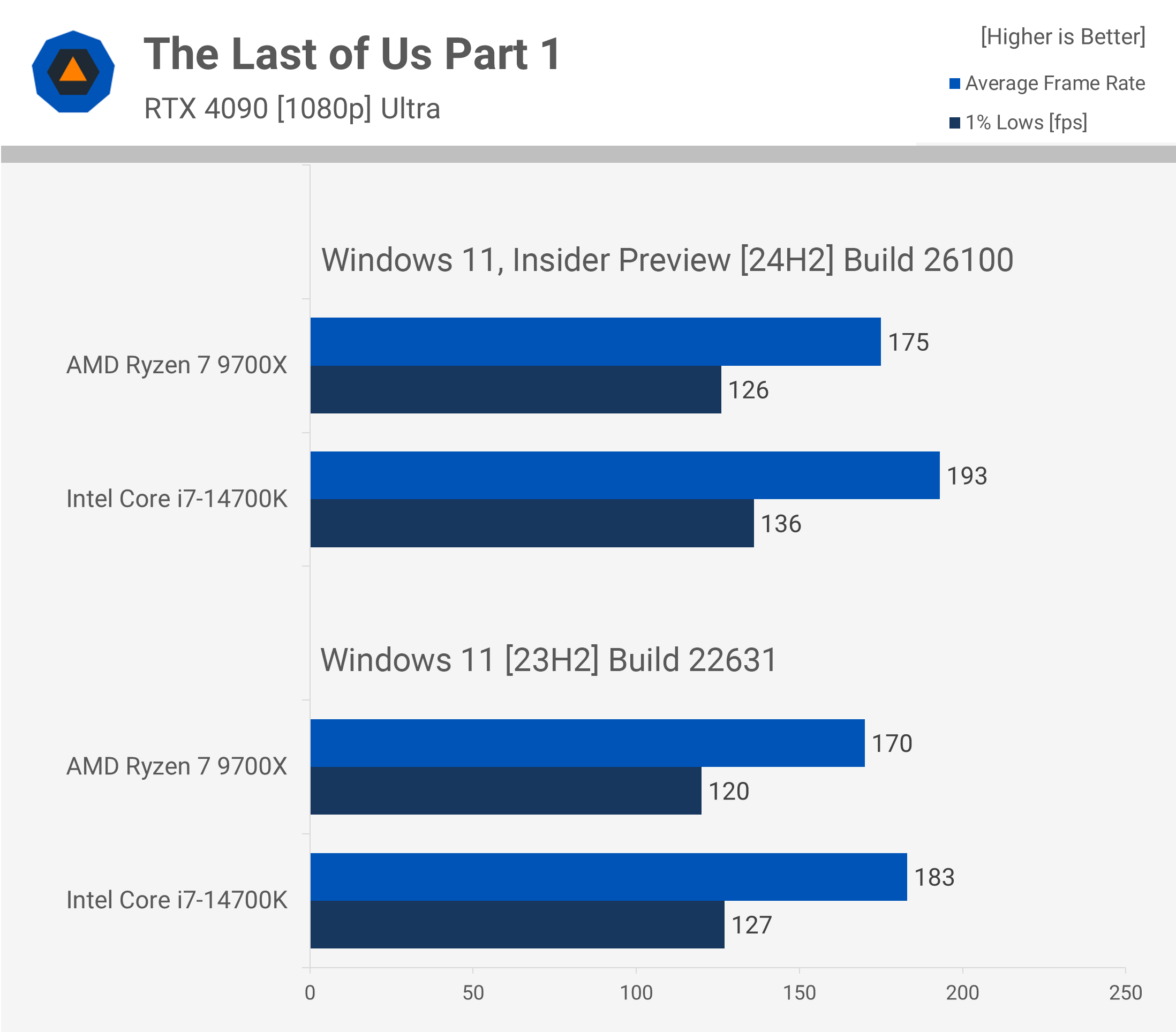
Fortnite
Fortnite is one of the games where we saw significant gains for Ryzen on 24H2, while Intel’s performance remained unchanged. This means that while performance is equal between these two processors on 23H2, upgrading to 24H2 allows the 9700X to pull ahead by 14%, delivering a notable performance uplift.
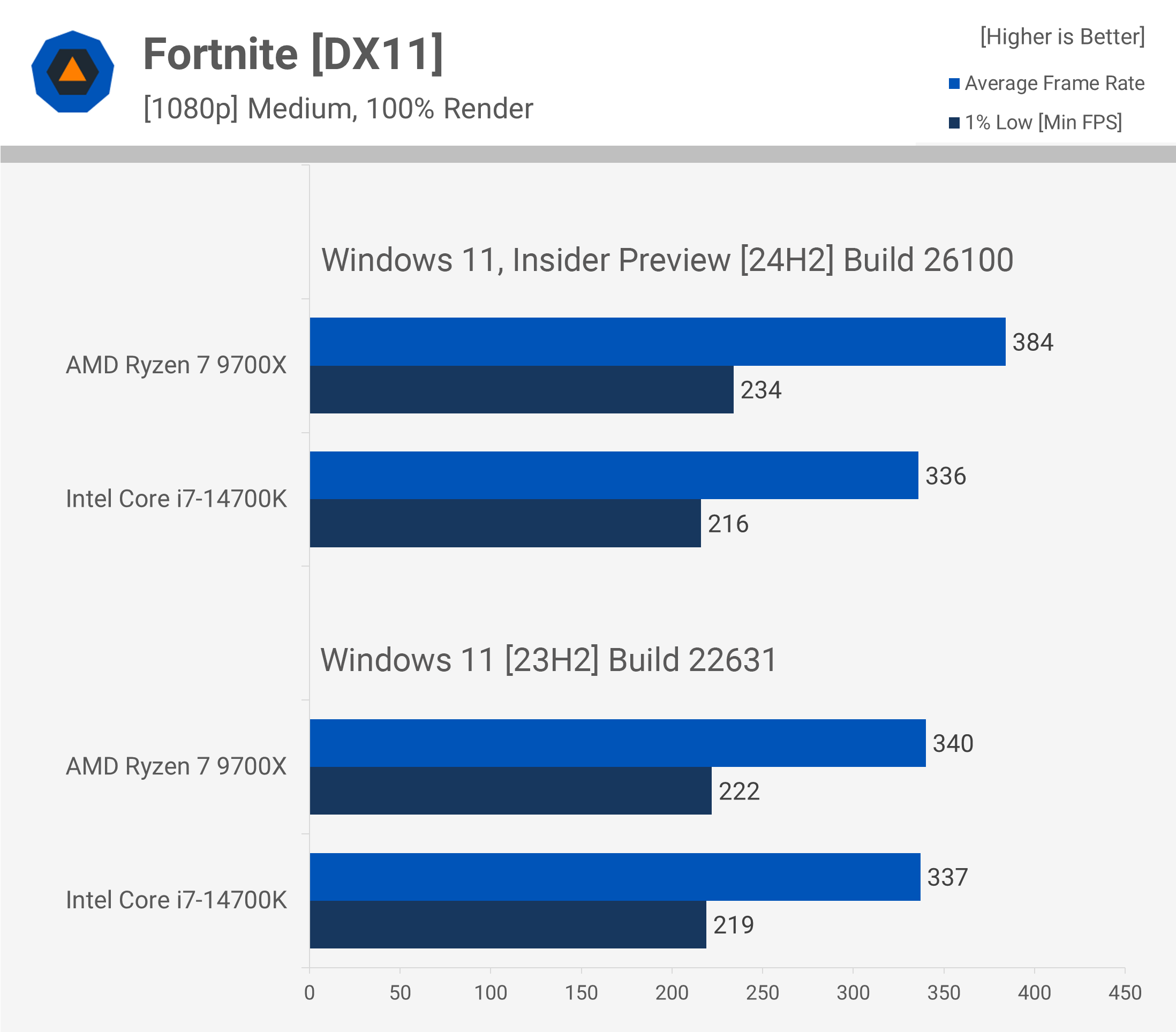
Starfield
From previous testing, we know Zen 5 processors don’t perform particularly well in Starfield, and the results here confirm that. The 14700K is at least 17% faster, especially when using the Insider Preview build. So, no matter how you look at it, the Core i7 is significantly faster in this title.
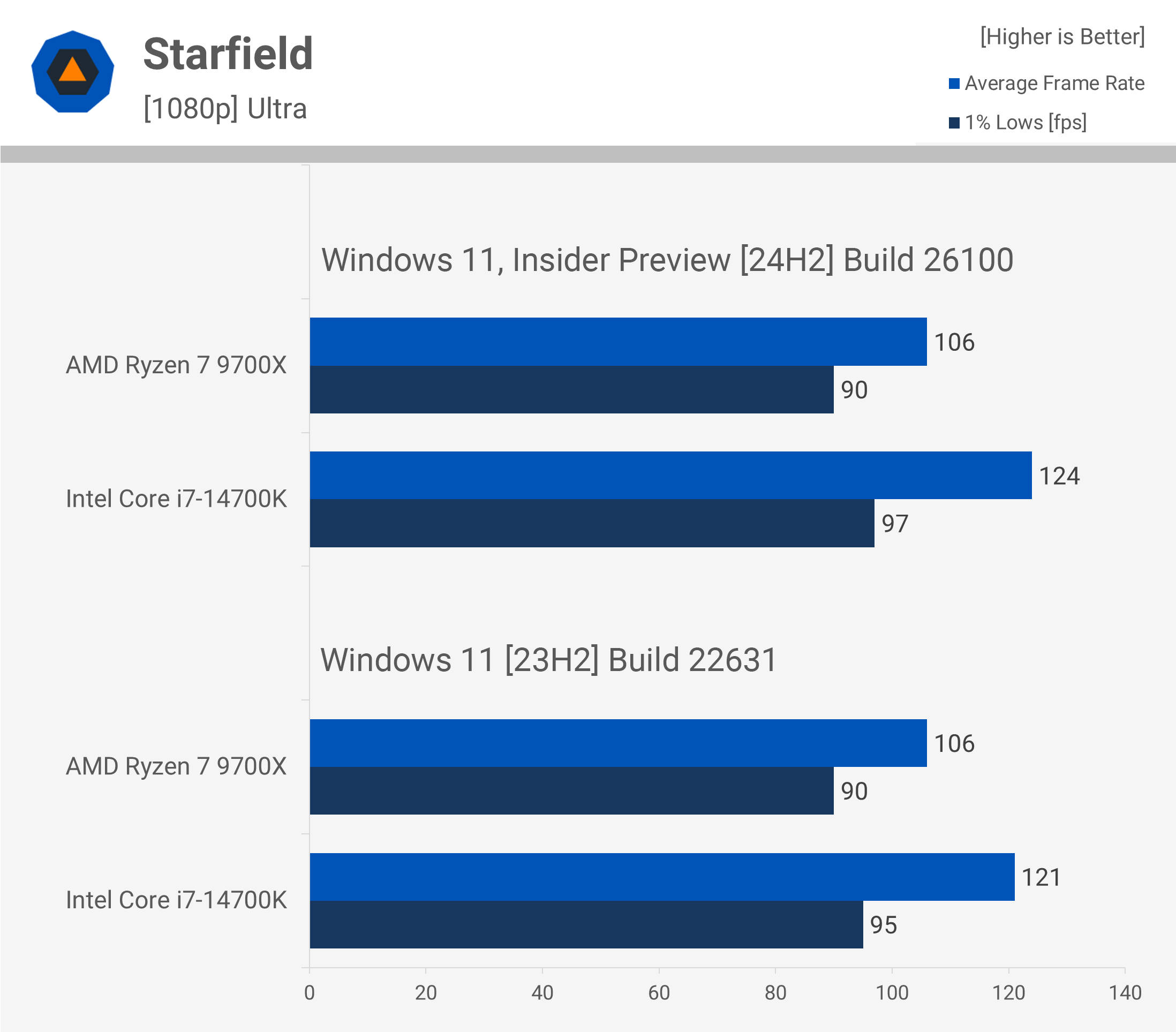
Watch Dogs: Legion
In Watch Dogs: Legion, using 23H2, the 9700X is 9% slower than the 14700K. Despite a 9% improvement when moving to 24H2, the 9700X remains 7% slower, as the Intel processor also saw a performance increase.
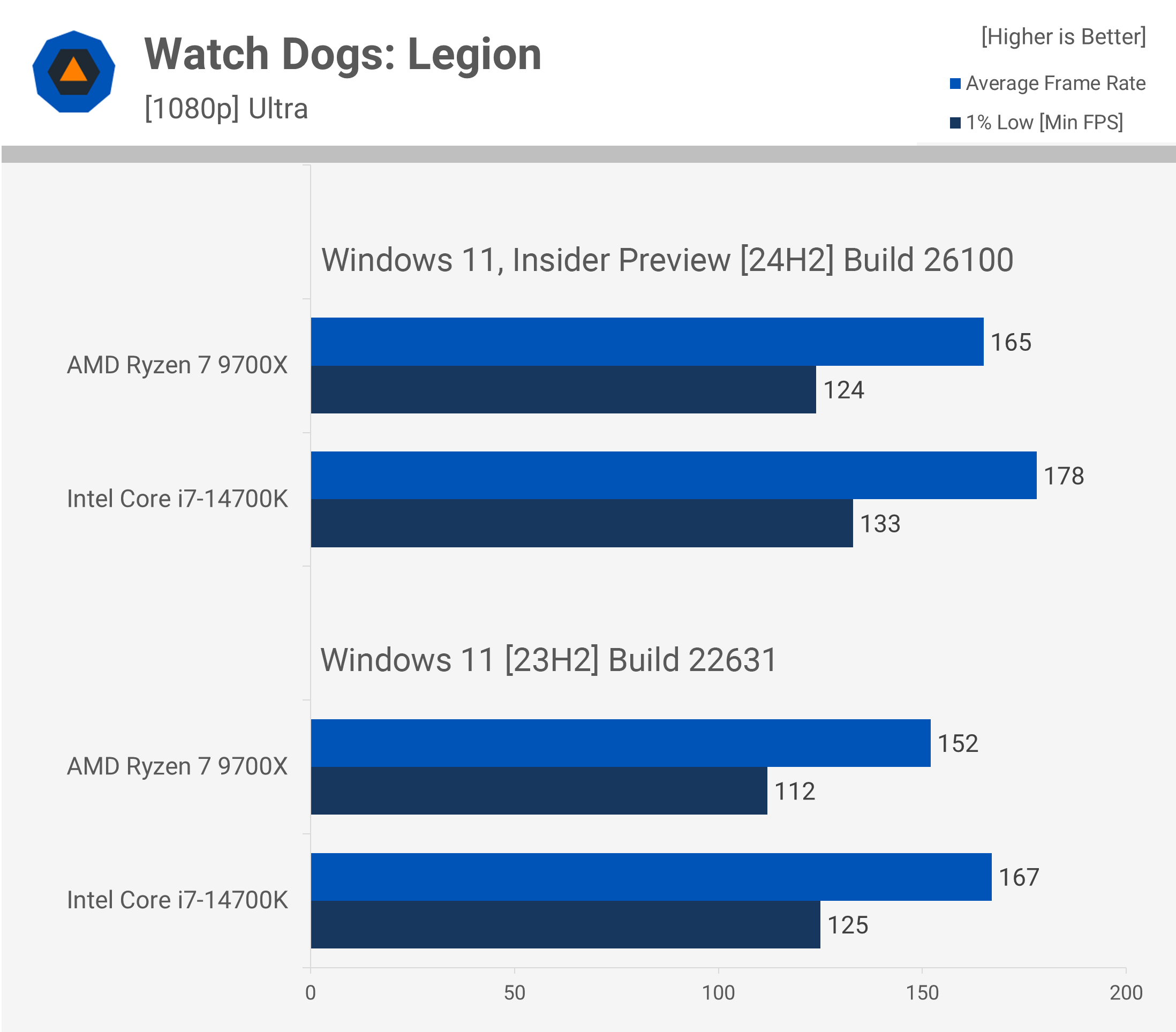
Remnant 2
The results in Remnant 2 are similar to what we’ve seen in Cyberpunk and Flight Simulator. The 9700X is much slower on 23H2, but 24H2 seems to resolve the issue for Ryzen. In this case, the 9700X was 13% slower on the current Windows 11 build but narrowed the gap to just 1% on the 24H2 Insider Preview build.
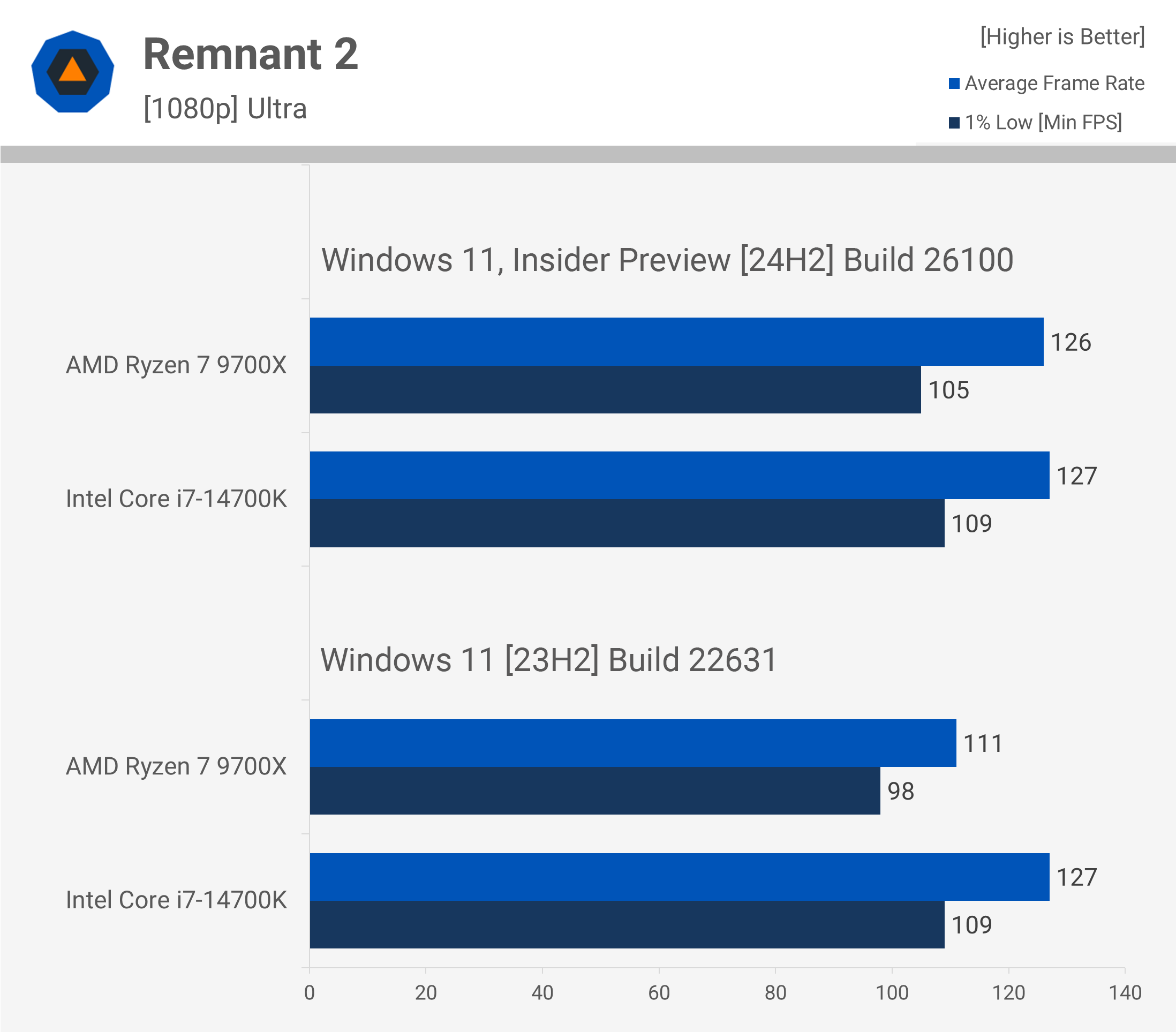
Horizon Forbidden West
No matter the Windows version, the performance in Horizon Forbidden West stays the same, with the 9700X consistently 7% slower than the 14700K.

The Riftbreaker
Lastly, we have The Riftbreaker, where the 14700K is significantly faster than the 9700X on 23H2. The Ryzen processor is 13% slower in this example, though that margin shrinks to 6% on 24H2. The Intel CPU remains faster, but the gap is noticeably smaller.
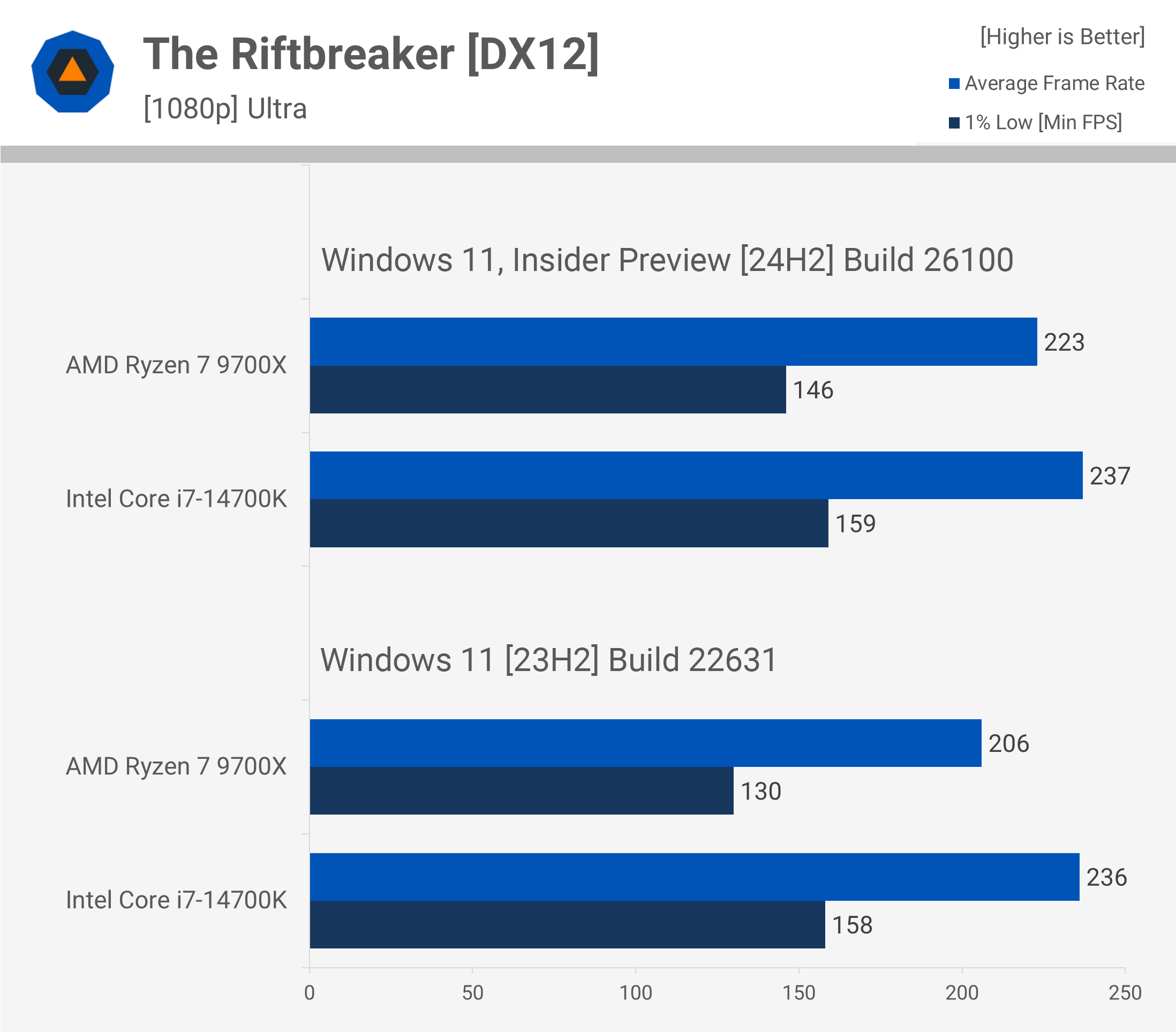
9700X vs. 14700K, 23H2
As we found in our day-one review testing 13 games, the 9700X is 5% slower than the 14700K on Windows 11 version 23H2. Testing across 42 games confirms this, with the 9700X lagging by 6% or more in 23 titles, and 13 of those saw double-digit margins. Clearly, the 9700X underperforms compared to the Core i7 in this environment.
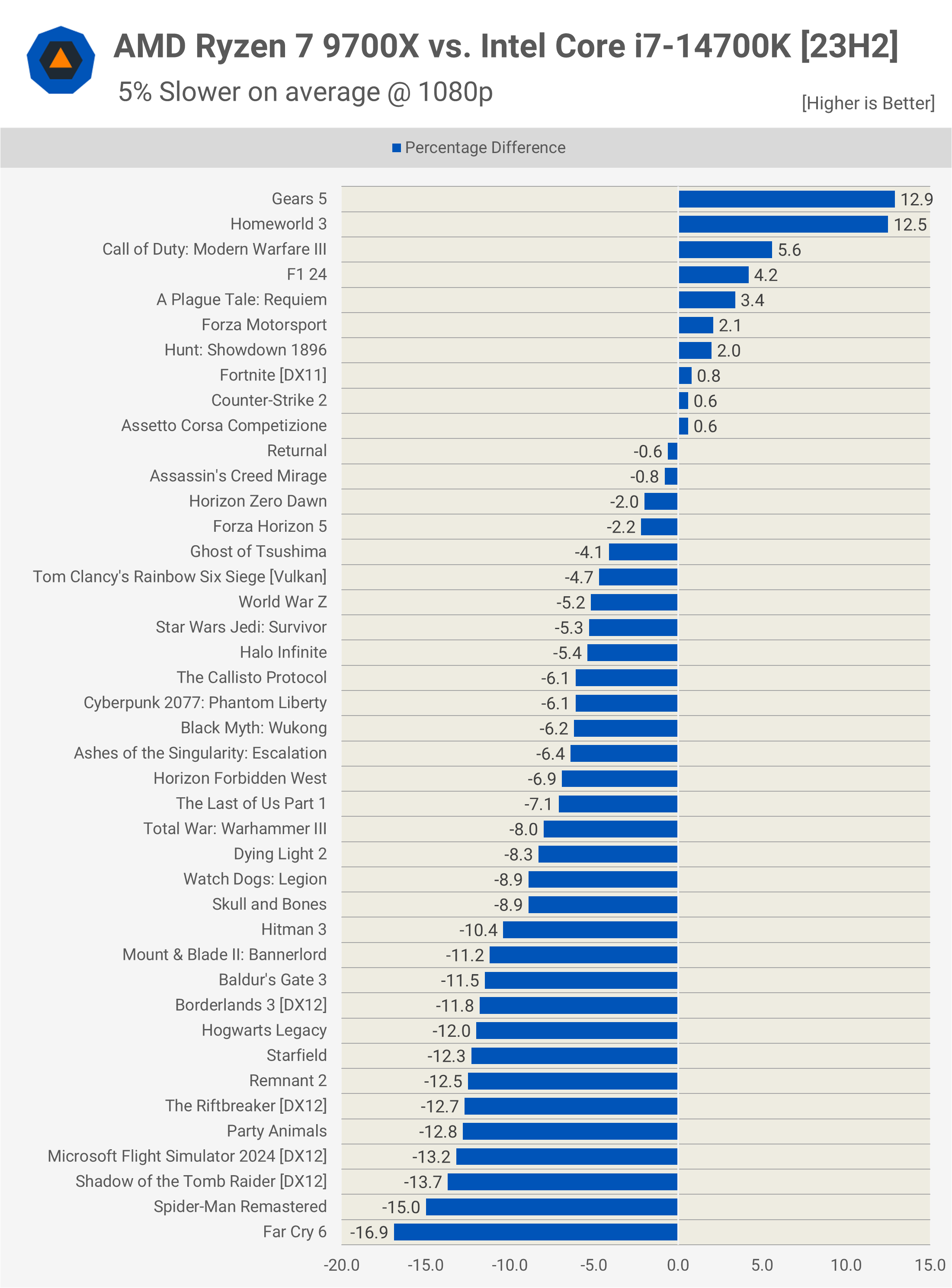
9700X vs. 14700K, 24H2
Upgrading to 24H2 reduces the performance gap, with the 9700X trailing the 14700K by just 3%. While the Intel processor still performs slightly better overall, you could argue that the results are now comparable. It’s not quite the parity AMD claims, but the difference is small enough that, with some cherry-picking, parity could be presented, as first-party benchmarks often tend to do.
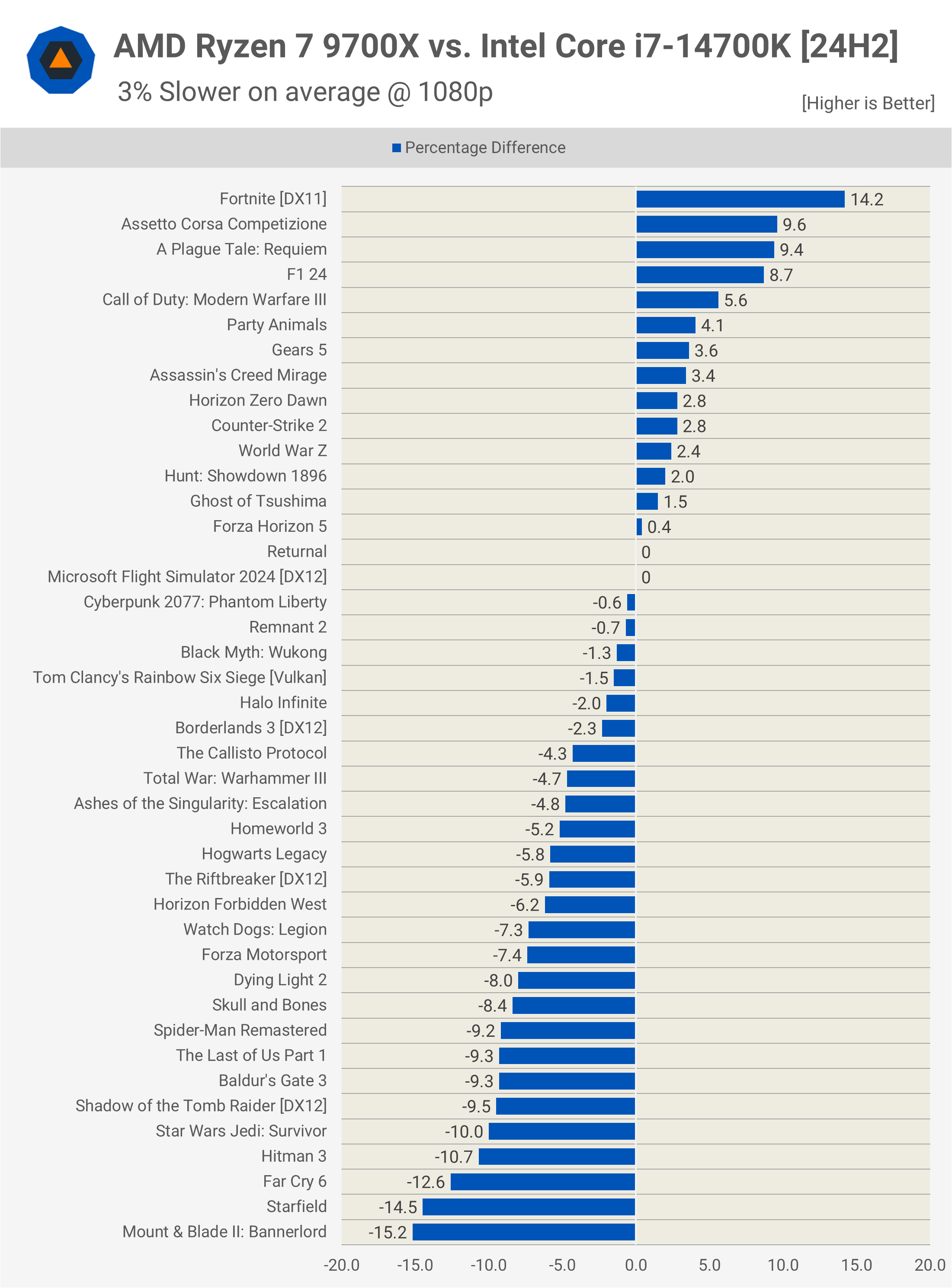
14700K 24H2 vs. 23H2
Where did the Core i7-14700K make the most significant gains on 24H2? There are three standout examples: Homeworld 3, Gears 5, and Star Wars Jedi: Survivor. However, these are outliers. Across the 42 games tested, 80% showed a margin of 5% or less. On average, the 14700K was just 3% faster when using 24H2. While there are some gains to be made, they’re not as substantial as with Ryzen, where the 9700X saw a 7% uplift.
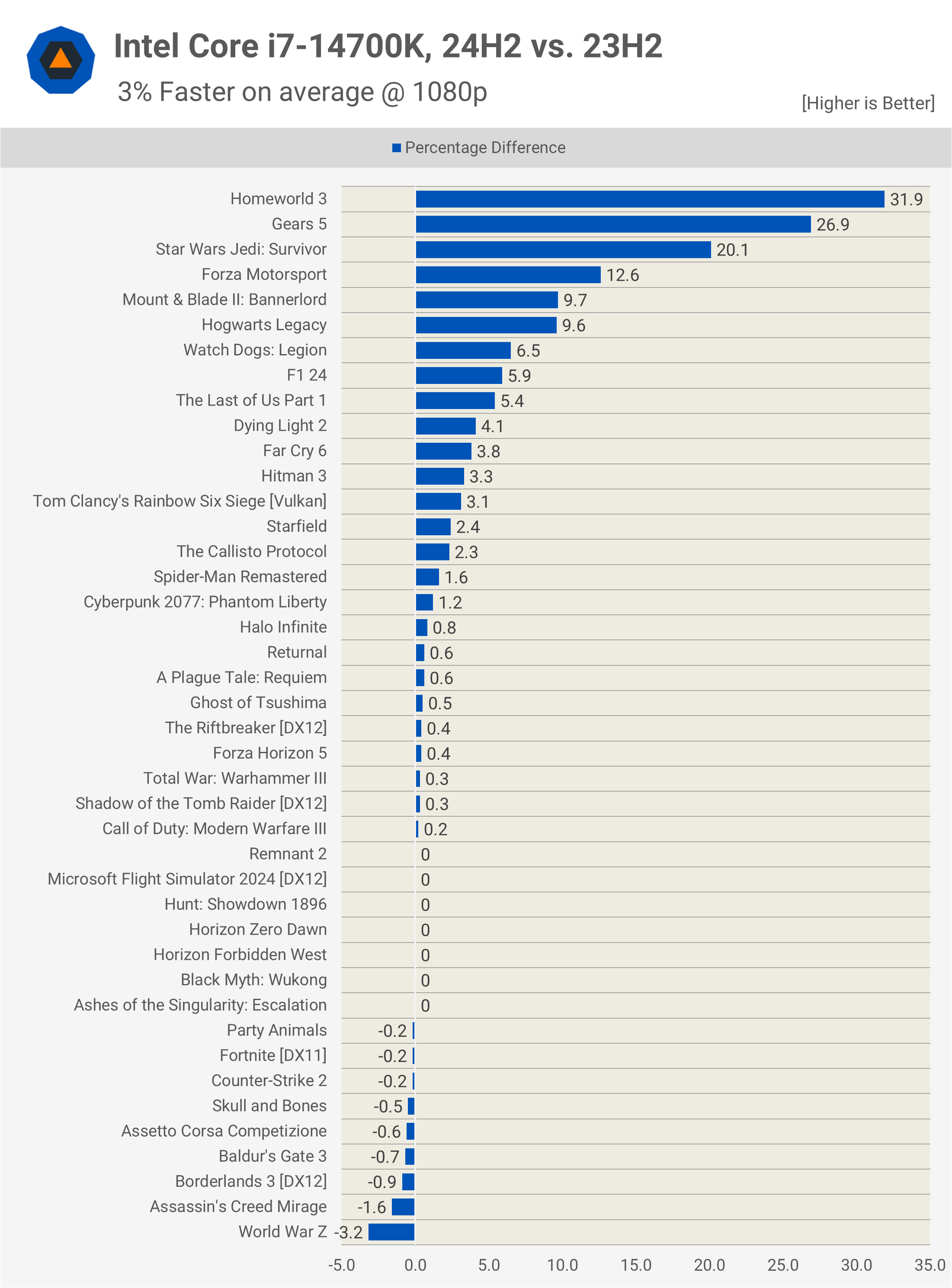
Power Consumption
Power Consumption: Baldur’s Gate 3
Since some readers might want to see the data, we’ve included power consumption figures using 23H2. In Baldur’s Gate 3, the 9700X consumed just 84 watts, while the 14700K drew a massive 171 watts. The Intel CPU did deliver 13% greater performance, but this came at the cost of a 104% increase in power usage.
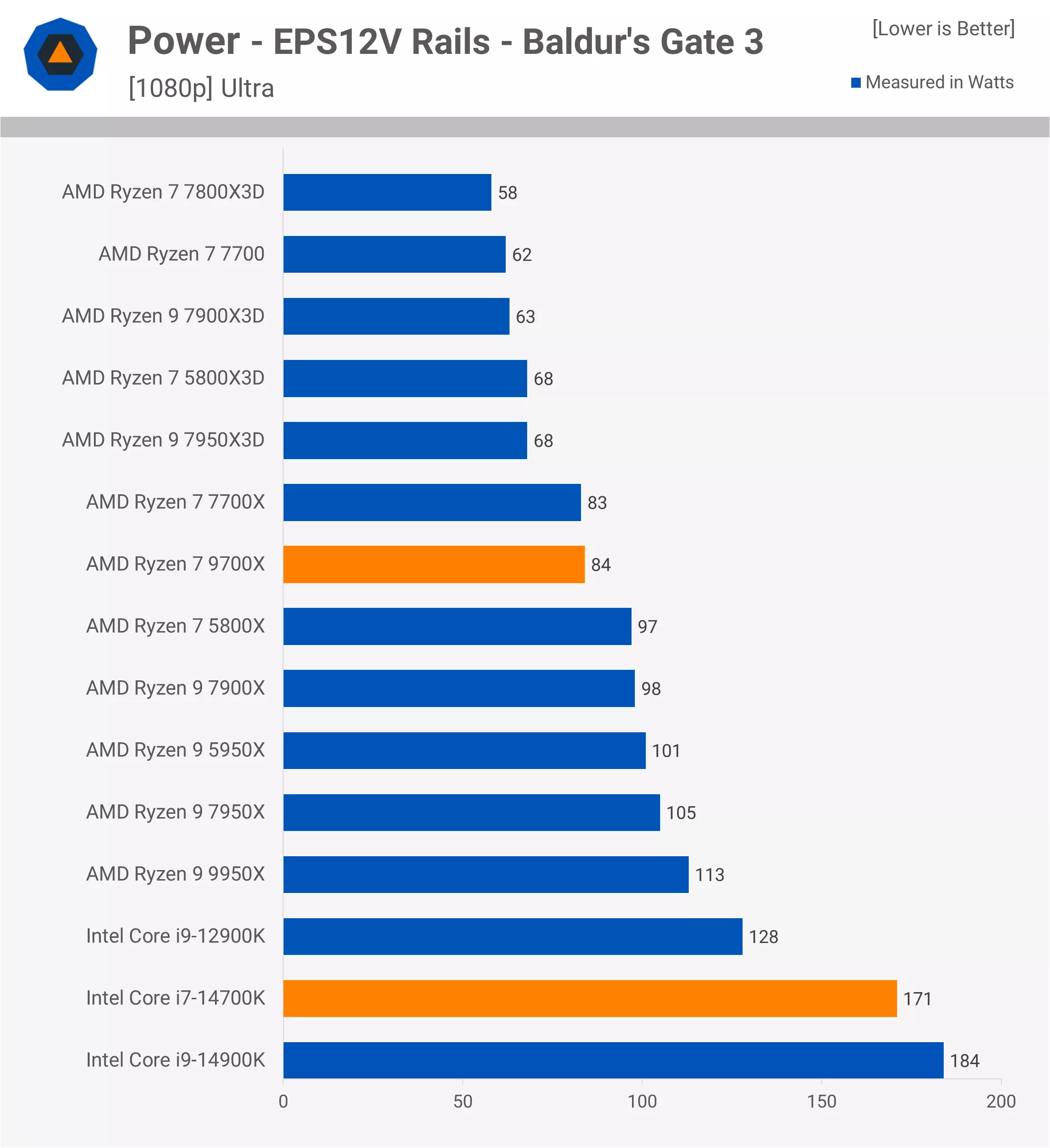
Power Consumption: The Last of Us Part 1
It’s a similar story in The Last of Us Part 1, where the 14700K offered 8% better performance but consumed 127% more power.
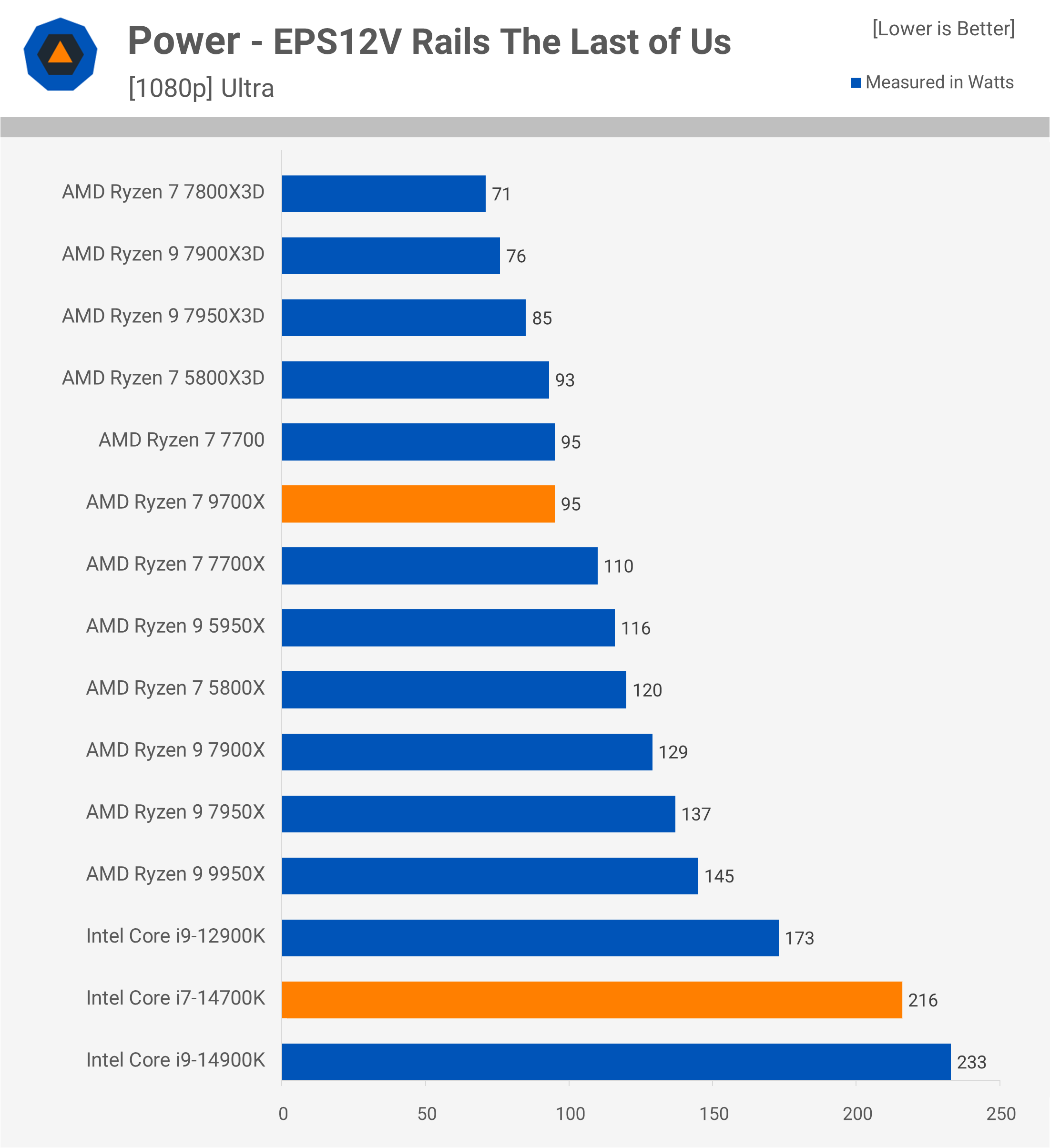
Power Consumption: Cyberpunk 2077: Phantom Liberty
Finally, in Cyberpunk 2077: Phantom Liberty, the 14700K was 7% faster, but once again required significantly more power – 129% more, to be exact, for a relatively small performance boost. This is why it’s been difficult, if not impossible, to recommend Intel’s 13th and 14th-generation CPUs, even before considering the stability concerns.

And the Winner Is…
This was a bit of an odd comparison because, while the Ryzen 7 9700X and Core i7-14700K are priced as direct competitors, we wouldn’t actually recommend buying either. The 14700K is priced at around $380, and the Ryzen 9700X is $340, but right now there are two other CPU alternatives that make far more sense.
If you’re seeking the best gaming performance, it makes more sense to spend a little extra and get the 7800X3D. However, that’s easier said than done, as availability is currently very poor.
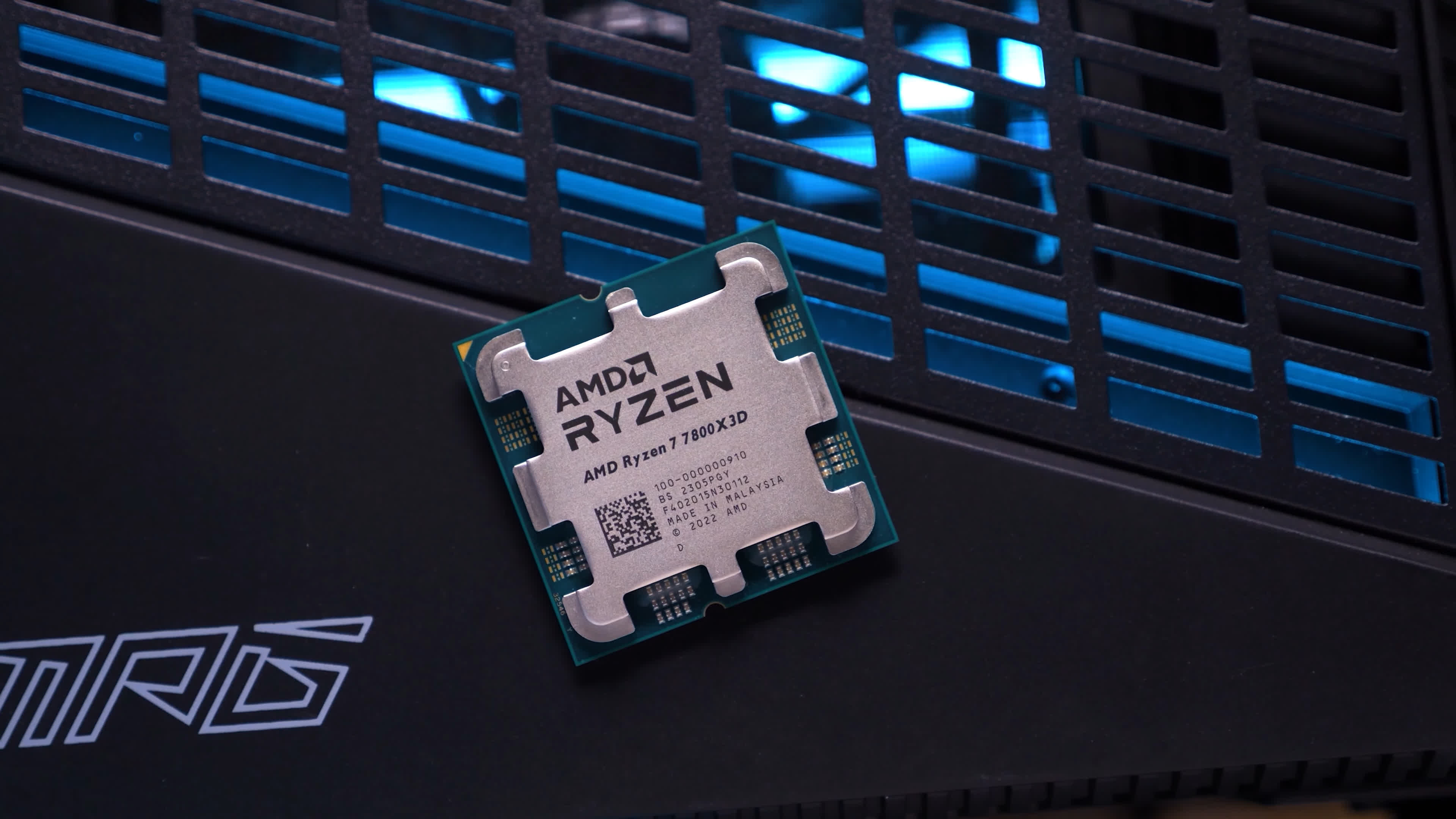
So in the event that the 7800X3D isn’t available, you can save money and opt for the 7700X, which you can grab for just $250 on Amazon, making it up to 26% cheaper than the 9700X. This is a much better deal for roughly the same level of gaming performance, regardless of the operating system, Windows 10 included.
The 9700X is a solid gaming CPU. As we’ve seen, it competes well with the 14700K while using substantially less power – almost to the point where it feels like the 9700X is generating energy compared to the Intel processor. However, the issue with the 9700X has always been its price, well that and AMD’s bad marketing claims.
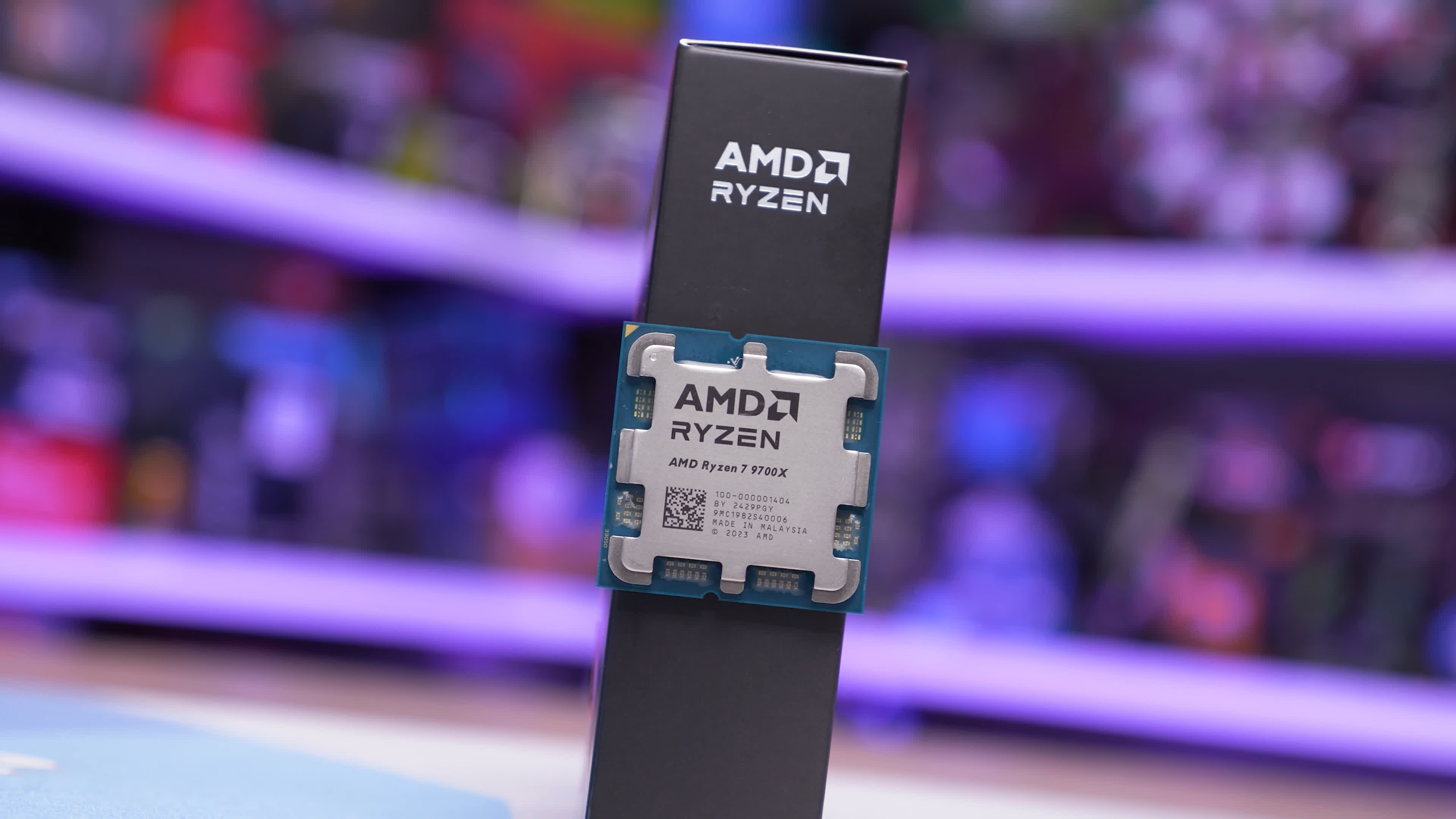
If the 9700X was priced closer to $280, we’d certainly recommend it. But at $340, you’re simply better off going for the 7700X.
As for the 14700K, while it is slightly faster overall, the excessive power usage disqualifies it as a viable option in our opinion. On top of that, there are serious stability concerns. Until we know whether the current updates resolve these issues, we can’t recommend the 14700K.

The winner in the 9700X vs. 14700K battle is… the 7700X. You’re welcome. All jokes aside, the main goal of this comparison was to evaluate how the Intel processor scales between the two versions of Windows 11. While there are gains to be made, the improvements are more significant for Ryzen processors, as we suspected.
For now, we’re waiting for the official rollout of 24H2 before doing any more CPU benchmarking. Hopefully, it will be released soon so we can update all of our CPU data – ideally before Intel’s next-generation processors arrive.
